The annual U.N. General Assembly has generated sometimes powerful comments by world leaders on issues involving North Korea, Iran, Afghanistan and the flight of minority Muslims from Myanmar as more than 100 heads of state and government gather in New York.
What’s happening:
- Yemen is a humanitarian catastrophe: And no one is doing anything to stop it
- Taiwan: They’re not even bothering to ask to attend this year’s U.N. General Assembly
- Japan: President Shinzo Abe says Japan will support whatever U.S. wants to do on North Korea
- Palestinian leader: Says Israel is thwarting peace efforts
- Iranian President: Rips Trump for “ignorant, absurd and hateful rhetoric”
- Iran nuclear deal: President Trump says he has decided what to do about it
- President Trump: In his first address before the General Assembly, Trump threatened to ‘destroy North Korea’ and called Kim Jong Un ‘Rocket Man’ | Read his full remarks here
- Afghanistan’s president: Praises U.S. plans to send more troops to the country
- Share via
U.N. chief urges Iran’s president to release detained 81-year-old Iranian American
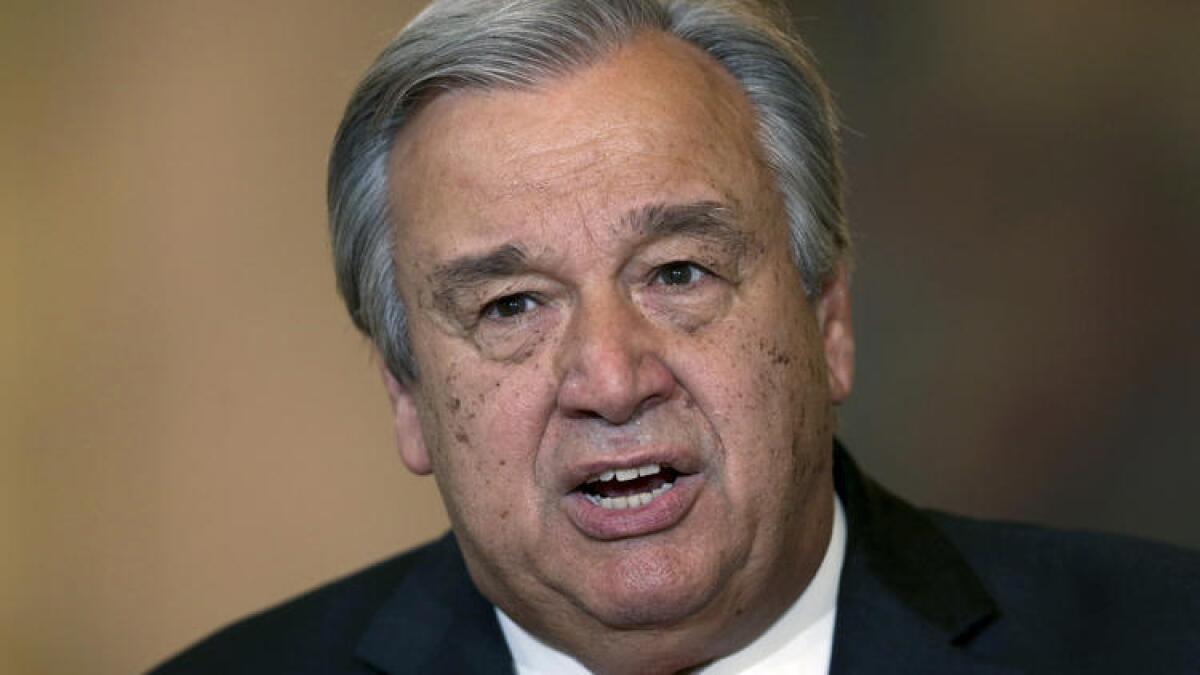
During his meeting with Iranian President Hassan Rouhani on the sidelines of the U.N. General Assembly, U.N. Secretary-General Antonio Guterres urged Rouhani to secure the release of detained Iranian American Baquer Namazi on humanitarian grounds, U.N. spokesman Farhan Haq said Friday.
Namazi is a retired official with the United Nations Children’s Fund who has been imprisoned in Iran for nearly two years.
He traveled to Iran in 2015 to try to secure the release of his son, Siamak Namazi, a U.S. citizen and businessman who had been arrested four months earlier.
Both were convicted of espionage last year and sentenced to 10 years in Tehran’s Evin Prison.
The 81-year-old Namazi’s ailing health in prison has been a major cause for concern. Before his arrest, Namazi underwent triple bypass surgery.
In addition to discussing Namazi’s case in their meeting on Monday, Guterres and Rouhani also discussed continued implementation of Iran’s 2015 nuclear agreement.
- Share via
Protesters beaten and removed during Turkish President Recep Tayyip Erdogan’s speech at New York hotel
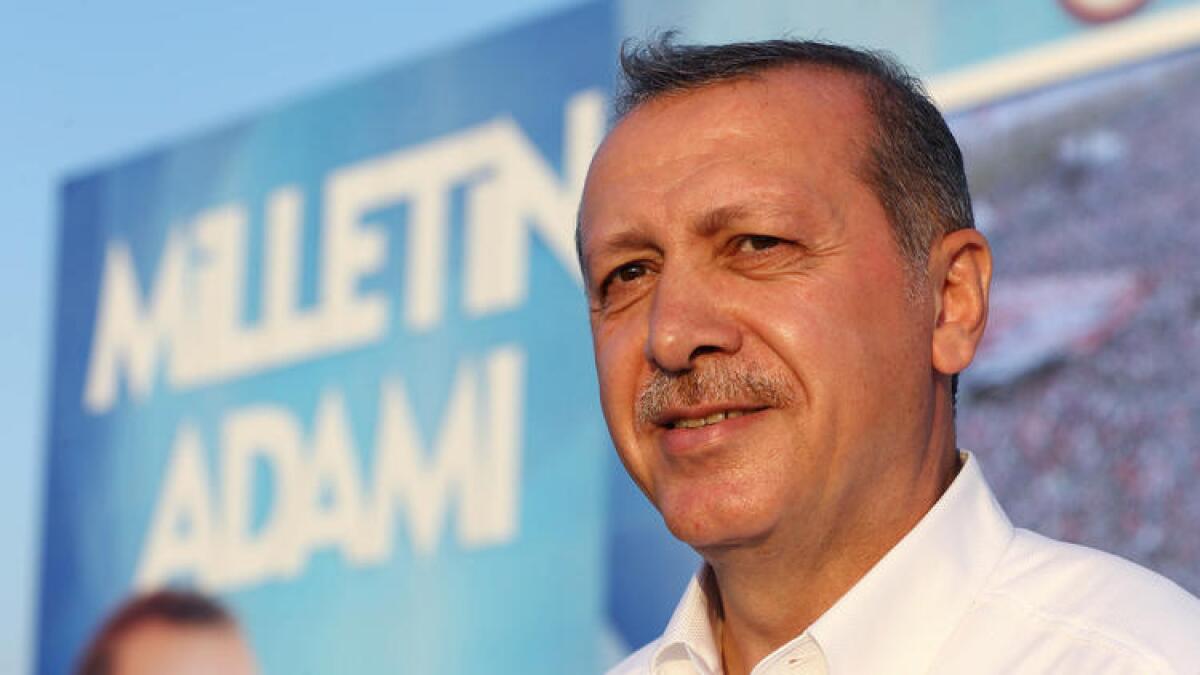
Violence broke out during Turkish President Recep Tayyip Erdogan’s speech in New York this week when protesters were beaten and removed, according to videos that began circulating on social media Friday.
It was the second such confrontation in recent months involving the Turkish leader, who has attracted widespread criticism for crackdowns on journalists, human rights advocates and political adversaries.
The latest incident occurred as Erdogan was giving a speech Thursday at the Marriott Marquis Hotel for an event sponsored by the Turkish American National Steering Committee.
Video footage shows protesters being pushed, punched and dragged out of the venue.
It is unclear how the confrontation began, but in some of the video footage protesters can be heard interrupting Erdogan’s speech and shouting, “Terrorist!”
Another video shows a man wearing a white T-shirt being punched in the face as a group of men wearing suits take him outside.
In the background, Erdogan supporters can be heard shouting the president’s name.
It is not clear whether the men seen confronting protesters were Erdogan’s bodyguards, hotel security or someone else entirely.
A similar situation took place in May when Erdogan’s bodyguards attacked and injured a handful of protesters outside the Turkish ambassador’s house in Washington.
The State Department issued a statement shortly after that incident saying the “conduct of Turkish security personnel ... was deeply disturbing,” and “violence is never an appropriate response to free speech.”
- Share via
Iran unveils new missile as President Rouhani vows his country will defend itself
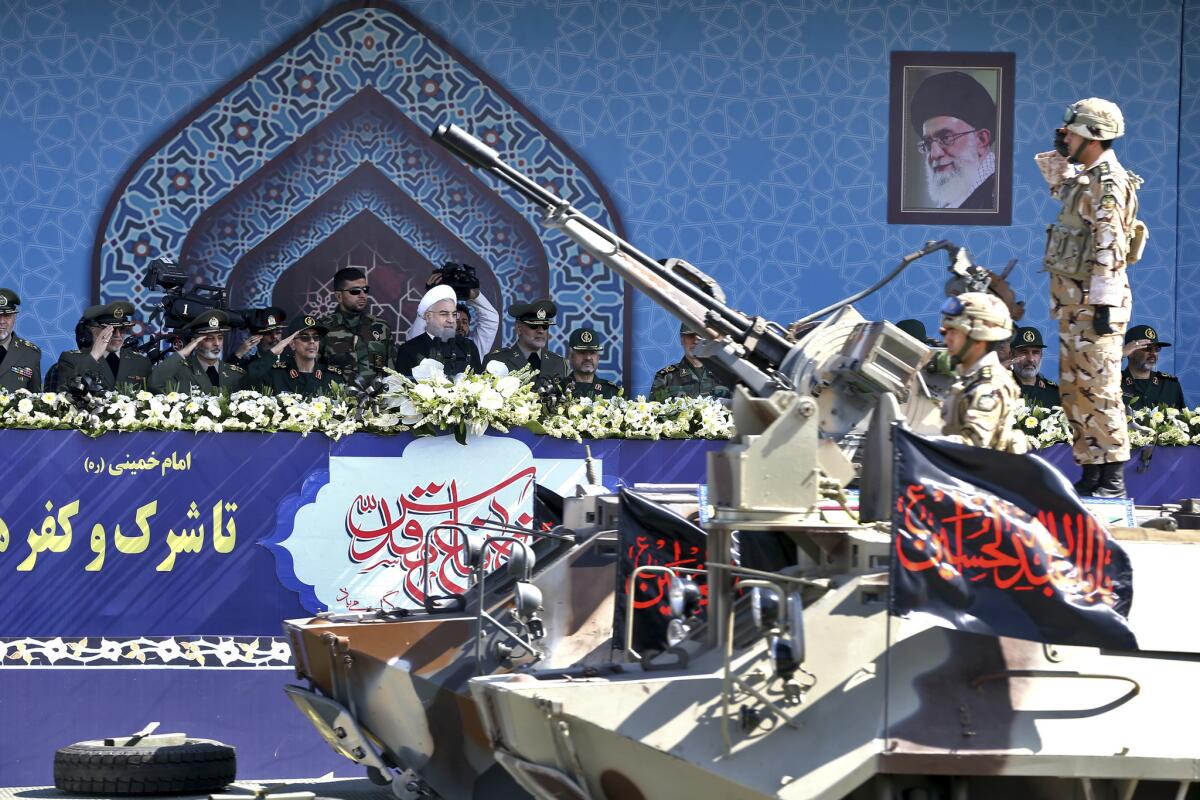
Iran unveiled a new medium-range ballistic missile on Friday as President Hassan Rouhani vowed that his country would defend itself at any cost from aggression by the United States and Israel.
Speaking at a military parade, Rouhani said Iran “will not ask for anyone’s permission to defend our land” and would continue to strengthen its missile program.
Rouhani’s comments, broadcast on the anniversary of Iraq’s 1980 invasion of Iran, appeared to be aimed at President Trump, who sharply criticized Iran in a speech this week at the United Nations General Assembly.
Trump called on world powers to pressure Iran to stop developing missiles and cease supporting regional militant groups. U.S. officials say such “malign activities” go against the spirit of the 2015 agreement under which Iran won relief from international sanctions in exchange for shelving its nuclear program.
Trump has criticized the nuclear deal and said it must be strengthened, or the U.S. could walk away.
Rouhani described the U.S. and Israel as the main destabilizing forces in the Middle East and said the speech by Trump and a later address by Israeli Prime Minister Benjamin Netanyahu were a “clear indicator of the vicious nature” of the two countries, according to the Tasnim news agency.
His comments came as the Iranian military introduced a new ballistic missile with a 1,200-mile range, capable of reaching Israel and carrying multiple warheads.
Gen. Amir Ali Hajizadeh, commander of the aerospace division of the elite Revolutionary Guards, said the defense ministry had manufactured the Khorramshahr missile and that it would soon become operational, Tasnim reported.
- Share via
The U.N. World Food Program is seeing substantial funding, but it’s still not enough to meet global needs
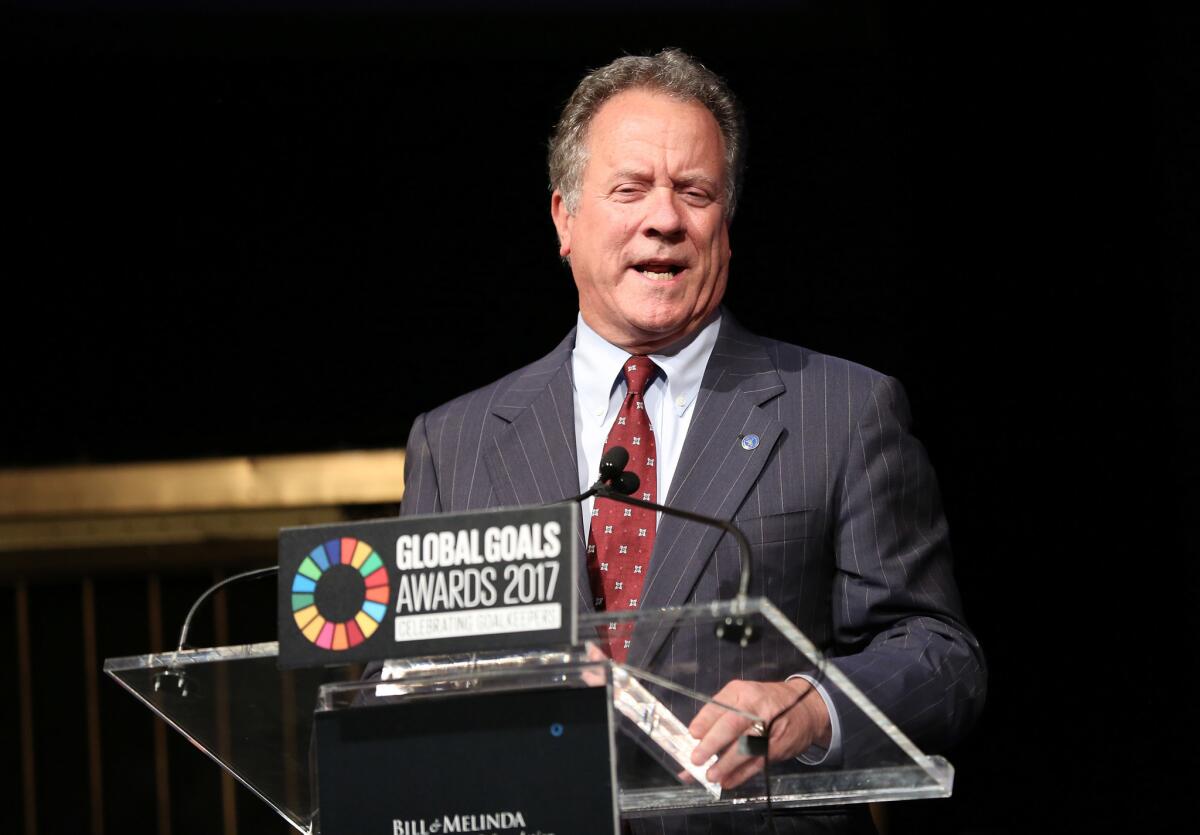
Funding for the United Nations World Food Program is substantial compared with other times in the agency’s history, but more is needed to meet global needs, the agency’s executive director said.
The United States is responsible for more than half the funding, David Beasley, executive director of the program, said this week during side briefings at the United Nations General Assembly in New York.
“That clearly indicates that the United States is not backing down [from] the humanitarian side of international issues,” Beasley told reporters.
Beasley, a Republican and former South Carolina governor who was nominated by President Trump to head the world’s largest food agency, said his first objective in assuming the position in April “was to protect U.S. funding and other major donor funding at a time period where we were facing the worst humanitarian crisis.”
Of the WFP’s $3.2 billion in funding, $1.7 billion is from the United States, Beasley said. Also of note was that funding for the WFP was passed with bipartisan support from legislators, he said.
“To see them find something that they could rally around, [something] positive … to help hungry children, it was a very significant message to the world,” Beasley said.
In July, at the Group of 20 summit in Germany, Trump pledged $639 million more in food and humanitarian assistance for fiscal year 2018 for South Sudan, Nigeria, Somalia and Yemen — countries hard hit by famine.
“That was a major shift,” Beasley said. “I feel like we’ve turned a great corner in [that] America’s not going to back down. Now the president is saying the U.N. truly has a purpose. It needs to be reformed. Everyone agrees with that.”
Beasley said that even though the WFP has substantial donations, “the needs are not being met.”
“The gulf states with all of their wealth should be funding the humanitarian crisis in their region of the world: Syria, Iraq, Yemen,” Beasley said, noting that the U.S. and Britain were among the largest donors helping Syrians, whose country remains devastated by civil war. “It’s absolutely inexcusable.”
Beasley also emphasized the need for the international community to do more to end the conflicts that have contributed to so many people being left hungry or starving.
- Share via
While Trump threatens to ‘destroy’ North Korea, Russia and China play war games in the East
While President Trump was threatening to “totally destroy North Korea” this week in his address to the United Nations, the navies of Russia and China were engaged a maritime joint exercise less than 100 miles from the North Korean border with Russia.
The Russia-China exercises were the second this year and part of the so-called Joint-Sea 2017 program. The first drills in the exercise were held in the Baltic Sea in July and were closely watched by NATO and European countries, who were already on edge about Russia’s recent military muscle-flexing.
This week’s drills started in the Russian Far East port city of Vladivostok, home base of the Russian Pacific Fleet, and will continue for eight days on both land and sea. Submarine rescue and anti-submarine drills will take place in the Sea of Japan and spread into the Sea of Okhotsk, just north of Japan.
While Russia and China have been holding joint military exercises since 2012, the timing of this part of the Joint-Sea 2017 drills is significant. Washington’s rhetoric has become increasingly hostile toward the North Korean government as it has continued to disregard demands that it halt testing of nuclear weapons. Both Moscow and Beijing have significant economic interests in North Korea and have thus far had subdued responses to calls from the White House for stepped-up action against North Korea.
On Thursday, Trump announced additional economic sanctions targeting North Korea.
Russia has responded to Trump’s tough rhetoric by urging more diplomatic dialogue. Russian President Vladimir Putin said earlier this month that pressuring North Korea with threats was “misguided and futile” if the goal is to get North Korean President Kim Jung Un to back down.
China, North Korea’s biggest trade partner, has balked at U.S. suggestions that it should step up pressure on North Korean’s authoritative, hermit state to prevent a nuclear standoff.
This week, the U.S. and South Korea also held joint maritime exercises in the Pacific region, where they conducted bombing drills.
Russia and China’s exercises in the Pacific started on Sept. 18, just a few days after Russia began a massive joint military drill with neighboring Belarus called Zapad 2017 on the border between those two former Soviet states.
NATO expressed concerns about the lack of transparency from Russia about the size and scope of the exercises. Russia is a signing member of the Vienna Document, which stipulated that any member who holds exercises with more than 13,000 troops must invite other members to observe. While Russia said there were only 12,700 troops participating, Western military analysts speculated that there could be as many as 100,000, based on similar Russian military drills in the past, in which more troops showed up than originally planned.
Russia is not required by the Vienna agreement to invite international observers to military drills held east of the Ural mountains.
- Share via
We’re close to wiping out polio but two obstacles stand in the way, officials say
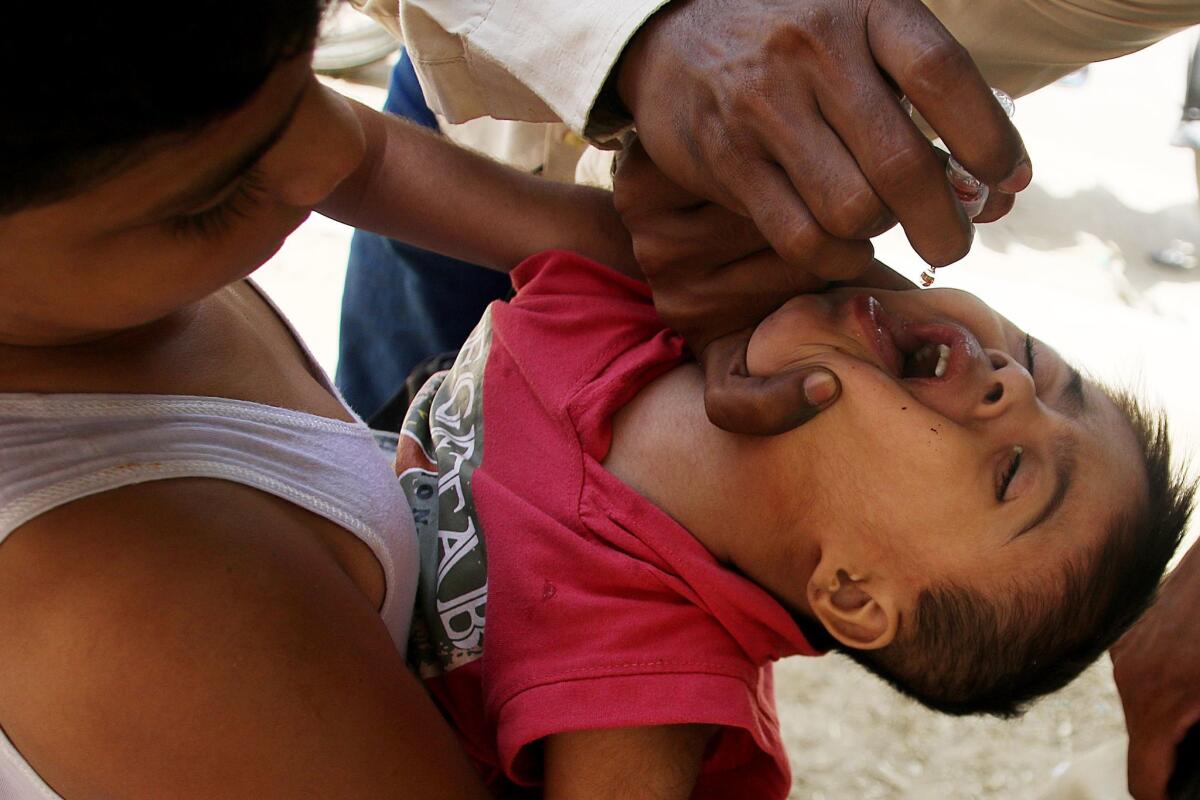
Significant strides have been made in halting the spread of polio and global health officials are on the verge of eradicating the crippling and potentially deadly disease — but two challenges stand in the way, according to international health officials and children’s advocates.
One is the lack of accessibility to particular areas in countries where the disease is prevalent, said Reza Hossaini, director of polio eradication at the United Nations Children’s Fund. Transmission of polio has never stopped in Afghanistan, Nigeria and Pakistan — where there are areas of conflict, insurgents have control, or infrastructure inadequacies limit access.
The other obstacle is the continued resistance of some parents to have their children vaccinated.
A lack of political commitment, religious norms and rumors about the possible effects of vaccinations, such as the belief in some Pakistani tribal areas that immunization causes male sterility, could all play a role, health officials said.
“Understanding that social dynamic, understanding what the underlying causes are is what we try to address,” said Hossaini, who spoke during a briefing to reporters on the sidelines of the U.N. General Assembly, where the theme of discussions is “Focusing on People: Striving for Peace and a Decent Life for All on a Sustainable Planet.”
The UNICEF official said that during the final stages of trying to eradicate the disease, the effort has come down to literally going to each house.
“We don’t do door-to-door anymore … we do room-to-room, because sometimes you have a silent resistance,” Hossaini said. “The parents would send the older kids, but [for] the younger kids, they would say we don’t have a child at home. So yes, it still remains a challenge in a very small area.”
As recently as 30 years ago, 1,000 children were paralyzed by polio every single day, according to the Global Polio Eradication Initiative, a partnership of UNICEF, the World Health Organization, Rotary International, the U.S. Centers for Disease Control and Prevention and the Bill & Melinda Gates Foundation.
There were only 37 reported cases of polio in 2016, according to the WHO.
- Share via
‘No hope on the horizon’ for Yemen, U.N. humanitarian official says
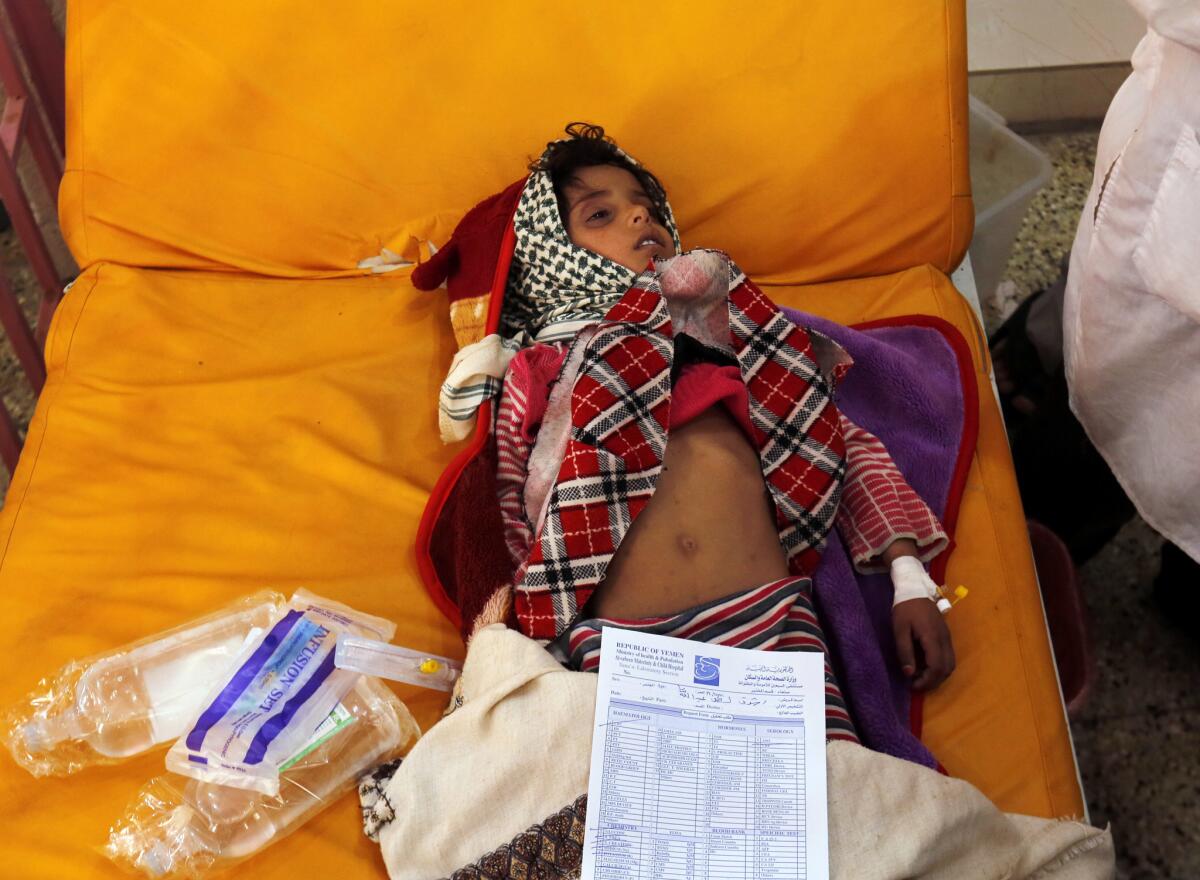
Devastated by conflict, widespread cholera and the total collapse of infrastructure, Yemen has reached the precipice of a humanitarian catastrophe and there is “no hope” for resolving the crisis anytime soon.
That grim assessment of the situation in the poverty-stricken Arab nation came during media briefings this week on the sidelines of the United Nations General Assembly, where the theme of discussions is “Focusing on People: Striving for Peace and a Decent Life for All on a Sustainable Planet.”
“The prescription for the future at the very best is bleak,” said Jamie McGoldrick, the U.N.’s resident humanitarian coordinator in Yemen. “It’s a disaster. I believe I’ll be coming back to [the U.N. General Assembly] next year with bigger numbers, and more desperate a situation … because there’s nothing on the horizon that looks like it’s going to go anywhere soon.”
Two years of conflict between pro-government forces and Shiite Muslim Houthi rebels have laid the groundwork for unhealthy conditions, according to humanitarian aid workers. The United States has been criticized for selling arms to Saudi Arabia, which leads an Arabian military coalition in support of Yemen’s government and has been accused of killing civilians in indiscriminate bombings.
“Civilians have borne the brunt of any pain and suffering,” McGoldrick said. “It’s one of the worst international humanitarian law violations situations. The parties to the conflict are completely indifferent to their obligations under the Geneva Conventions [rules that protect people who are not participants in the conflict].
McGoldrick painted a dire picture of conditions in the nation of 27 million people, of which about 3 million have been displaced. Among the horrifying facts: At least 7 million people don’t know when their next meal will come and what it might be. About 400,000 children under the age of 5 are acutely malnourished and every 10 minutes a child dies. Fifty percent of the health structures don’t work, while 1,700 schools don’t function, 30,000 health workers have not been paid salaries and 2 million children are out of school.
“There’s a lost generation,” McGoldrick said. “There’s a growing radicalization in the country because of absence of governance, absence of security.”
The country’s cancer center has closed, McGoldrick added. The blood banks are under pressure. Dialysis is no longer available because the machines don’t work. Treatment is lacking for diabetics.
“And all of that is having an impact on an already weakened population,” the humanitarian official said. Throughout the country, “people are dying … silent deaths,” he said.
Exacerbating the death toll is the Saudi-led coalition’s halt of all commercial traffic in and out of the international airport in the country’s capital, Sana.
As many as 10,000 Yemenis are reported to have died from critical health conditions because they could no longer travel overseas for medical treatment, according to international media reports citing local government data.
“There’s no hope on the horizon right now politically,” McGoldrick said. “So the result of that is there’s no hope on the horizon for the humanitarian situation, because we cannot solve this problem. This is a political problem.”
- Share via
Taiwan isn’t even asking this year to be let into the U.N.: ‘Why bang your head against the door?’
Taiwan has its own military, currency and immigration controls. Despite these hallmarks of nationhood, the island of 23 million people cannot join the United Nations or observe the events of U.N. organizations.
After more than 10 years of trying, Taiwan has run out of applications to get inside the United Nations itself, the U.N.-backed World Health Assembly, its climate control convention and the International Civil Aviation Organization.
All applications are dead, a Taiwanese Foreign Ministry publicist said Wednesday.
China, a veto-power-wielding member of the U.N. Security Council, doesn’t want Taiwan in. Beijing views Taiwan not as a country but as part of Chinese territory. Taiwan’s legal government, the Republic of China, fled to the island after losing the Chinese civil war in the 1940s to the Communists who now rule Beijing.
Taiwan left the United Nations in 1971 as China entered, welcomed by other members for its vast population and fast-growing economy. China now has more than 170 foreign allies. Taiwan has 20.
“Why bang your head against the door again and again without any hope that it will open?” asked Coen Blaauw, executive director of the Washington-based Taiwan advocacy group Formosan Assn. for Public Affairs.
Taiwanese people want more recognition for their economy, the world’s 22nd largest, according to the International Monetary Fund, and humanitarian work overseas even in countries that don’t recognize it diplomatically. Officials in Taipei hope to get U.N. data first-hand.
“It is obvious that Taiwan’s exclusion from the meetings of several of the U.N.’s specialized agencies both delays Taiwan’s access to critical information and deprives the international community of contributions that Taiwan can make,” said Alan Romberg, East Asia Program director with American think tank the Stimson Center.
“The U.S. and others seek to fill the gaps for Taipei by acting as a conduit, but this cannot be a fully adequate substitute,” he said.
Three successive Taiwanese presidents have asked sympathetic U.N. member states to lobby for letting it in outright or observe sub-agencies.
Under Taiwan’s past president, Ma Ying-jeou, China in effect allowed Taiwan to observe annual World Health Organization assemblies, officials on the island said then, because Ma had set aside political disputes with Beijing in order to hatch an unprecedented dialogue between the two governments. Current President Tsai Ing-wen has angered China by declining to see the two sides as part of one country.
Taiwan lost its WHO assembly observer status in May. After Tsai took office, the government last year applied for permission to participate in that group, the aviation body and the U.N. Framework Convention on Climate Change.
As the United Nations opened its 72nd General Assembly session Sept. 12 in New York, the Foreign Ministry issued a statement saying its diplomatic allies on the inside had urged U.N. Secretary-General Antonio Guterres to see Taiwan’s point and “solve the problem” of its non-access.
Last week the 6,000-member, Taipei-based civic group Taiwan United Nations Alliance emailed all 193 U.N. members with a letter saying Taiwan’s people should not be excluded since 80% of the population is “longing to be a new member,” alliance President Michael Tsai said.
The alliance drew 1,000 people to a demonstration Saturday in Washington.
The Taiwanese government, he said, should “stand up firmly” and apply for U.N. membership by writing its own letter to the secretary-general.
- Share via
Japan’s leader says North Korea threat ‘unprecedented,’ backs U.S. stance that all options are on the table
If Japan has any qualms about President Trump’s confrontational rhetoric toward North Korea, its leader isn’t letting on.
“We consistently support the stance of the United States that all options are on the table,” Japanese Prime Minister Shinzo Abe told the U.N. General Assembly on Wednesday, five days after North Korea sent a ballistic missile streaking above the Japanese archipelago — the second such overflight in less than three weeks.
Abe, speaking a day after Trump threatened to “totally destroy” North Korea if necessary to defend the United States or its allies, declared that the North’s mercurial leader, Kim Jong Un, is a greater menace than ever.
“The gravity of this threat is unprecedented,” Abe told the world body. “It is indisputably a matter of urgency.”
He said Kim had a tendency to “dismiss with a smirk” outside efforts to rein in the North’s nuclear and missile programs, and cited the North’s history of “deceiving us and buying time.”
“It was absolutely not a lack of dialogue that gave rise to this situation,” Abe said in remarks devoted almost entirely to the North Korean threat.
Calling for international solidarity, the Japanese leader warned that “there is not much time left” to defuse the North Korean threat.
Kim has singled out U.S. ally Japan for frequent apocalyptic threats. Last week, North Korea threatened to “sink” the Japanese islands, saying Japan “no longer needed to exist near us.”
- Share via
Palestinian leader, at the U.N., says Israel thwarts peace efforts
Palestinian Authority President Mahmoud Abbas told the U.N. General Assembly on Wednesday that “Israel is not interested” in achieving peace.
“A commitment to peace by one side is not enough,” said Abbas, who listed various peace blueprints put together over the decades and accused Israel of sabotaging them all.
The Palestinian leader spoke a day after Israeli Prime Minister Benjamin Netanyahu addressed the world body. In his speech, Netanyahu made only a brief reference to hopes for peace with all of Israel’s Arab neighbors in the region, including the Palestinians.
In his address to the chamber, the 82-year-old Palestinian leader declared that “the two-state solution is in jeopardy,” referring to the aim, long supported by Washington, for Israel and a Palestinian state to exist side by side. President Trump has been more equivocal than predecessors about such a scenario, though senior aides say it remains the U.S. goal.
Abbas also suggested that Israel was seeking to ignite a “religious war” with repeated provocations over a disputed holy site in Jerusalem’s Old City, and denounced Jewish settlement-building activity in the West Bank and East Jerusalem, saying “Israel builds wherever it wishes.”
Trump has spoken frequently and enthusiastically about prospects for Mideast peace, putting his son-in-law Jared Kushner in charge of an effort to bring the two sides to the table, but if anything, the two sides’ positions have hardened since the U.S. president took office.
Earlier Wednesday, Trump met with Abbas on the sidelines of the General Assembly, telling reporters as the two headed into their talks that “I think we have a very, very good chance” for achieving peace.
“Complex subject, always been considered the toughest deal of all,” Trump said, adding, “I think we have a pretty good shot, maybe the best shot ever.”
- Share via
Iranian president goes after Trump, denounces ‘ignorant, absurd and hateful rhetoric’
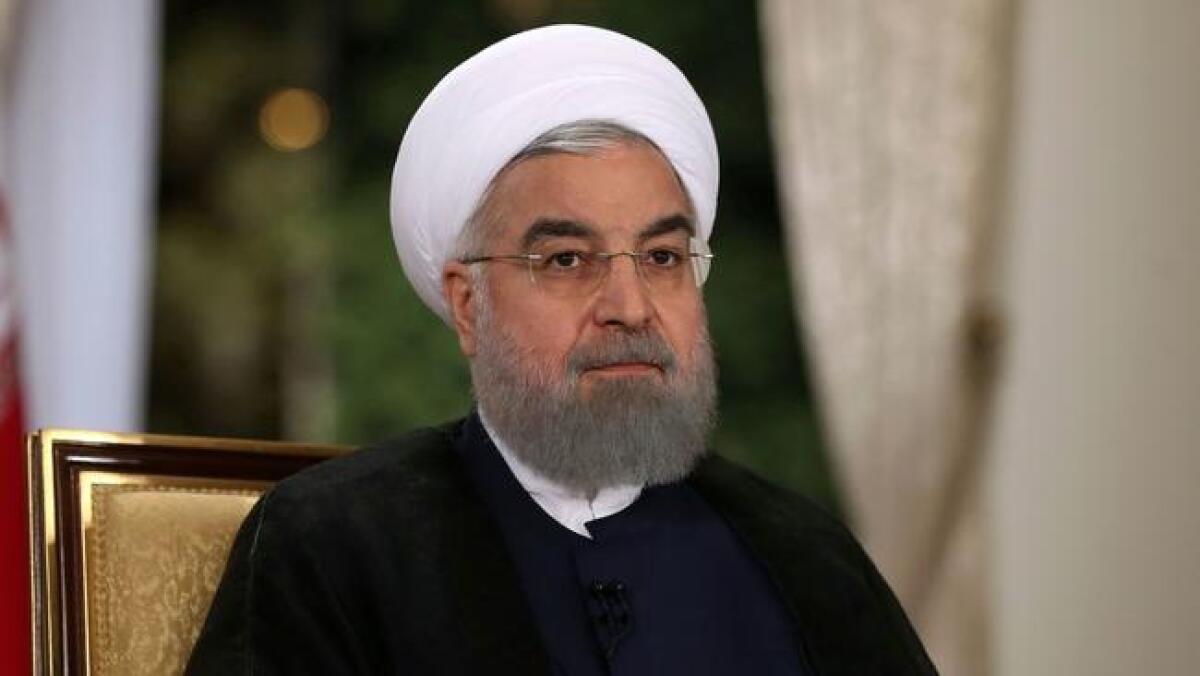
Iranian President Hassan Rouhani, addressing the U.N. General Assembly on Wednesday, sharply questioned President Trump’s authority to single-handedly scrap the landmark 2015 Iran nuclear accord, saying the pact “belongs to the international community in its entirety, and not only to one or two” governments.
“It would be a great pity if this agreement were to be destroyed by rogue newcomers to the world of politics,” the Iranian president said, an apparent reference to Trump’s repeated hints — including one delivered at the world body a day earlier — that he was poised to tear up the accord, which was negotiated between six world powers and Iran.
Trump told reporters on Wednesday he had made a decision about the pact, but did not disclose it.
Rouhani, together with then-President Obama, was a chief architect of the accord.
The speech was laced with direct and indirect denunciations of Trump, who a day earlier had referred to Iran as a “rogue nation.” Without mentioning Trump by name, the Iranian leader decried “ignorant, absurd and hateful rhetoric” delivered in the chamber a day earlier. He singled out “the new U.S. administration” in saying it would destroy its own credibility by abrogating international agreements.
The 2-year-old nuclear agreement, negotiated by the United States, the European Union and other partners, led to the lifting of most international sanctions against Iran in return for curbs on its nuclear program.
Rouhani, who won a second presidential term earlier this year, said Iran would not be the first to violate the agreement, but that it would take unspecified steps if others did so.
“We never threaten anyone, but we do not tolerate threats from anyone,” he said. “We believe in dialogue based on equal footing and mutual respect.”
- Share via
Trump: ‘I have decided’ what to do with the Iran deal. What’s that? He won’t say
President Trump said Wednesday he has made a decision on the 2015 Iran nuclear deal - but didn’t say if he would scrap the landmark agreement or stay in it.
“I have decided,” Trump repeated three times in response to shouted questions from reporters. When pressed on what specifically he decided, Trump smiled and said, “I’ll let you know.”
By his cryptic response, Trump seemed to be bringing to global diplomacy his penchant for building suspense honed during years as a reality television star. Yet as recently as Tuesday, administration officials were still preparing options for him to consider before an Oct. 15 deadline for certifying Iran’s compliance with the agreement to block its work toward nuclear weaponry.
Trump made the comments as he sat down to talk with Palestinian Authority President Mahmoud Abbas in the Lotte Palace Hotel in New York City.
Trump also is meeting Wednesday with leaders of Jordan, Egypt and the United Kingdom as the United Nations General Assembly continues to meet a few blocks away.
Trump has not hidden his disdain for the Iran deal, which was negotiated by the Obama administration along with England, France, Russia, China and Germany. As a candidate and since, he vowed to abandon the agreement.
Under its terms, Iran agreed to destroy or dismantle its nuclear development infrastructure in exchange for easing international sanctions.
In his first speech to the General Assembly on Tuesday, Trump called the accord “an embarrassment” for the United States and hinted he would revisit it.
“I don’t think you’ve heard the last of it, believe me,” Trump said, adding that the U.S. “cannot abide by an agreement if it provides cover for the eventual construction of a nuclear program.”
The U.N. Security Council endorsed the deal two years ago, and the U.N.’s nuclear watchdog agency, the International Atomic Energy Agency, has repeatedly concluded that Tehran is complying with its obligations under the accord. So has Trump, twice, since he took office.
Several of Trump’s close advisors have tried to convince him to stay in the deal for the next few months to give them time to work with allies to toughen some terms of the agreement.
French President Emmanuel Macron in particular has been working with other European leaders behind the scenes on adding additional measures.
On Sunday, Secretary of State Rex Tillerson said that Iran is in “technical compliance” with the agreement, but said it has violated the spirit of its preamble by continuing to support terrorism and building ballistic missiles.
The U.S. has maintained sanctions on Iran related to those concerns, however.
Under U.S. law, the Trump administration faces an Oct. 15 deadline to inform Congress that Iran following the terms of the nuclear deal.
If Trump won’t certify Iran is complying, Congress will have 60 days to decide if sanctions related to Iran’s nuclear program should be put back in place, an action that would effectively scrap the U.S. side of the deal.
- Share via
Afghan President Ashraf Ghani emphasizes terrorist threats and backs new U.S. strategy
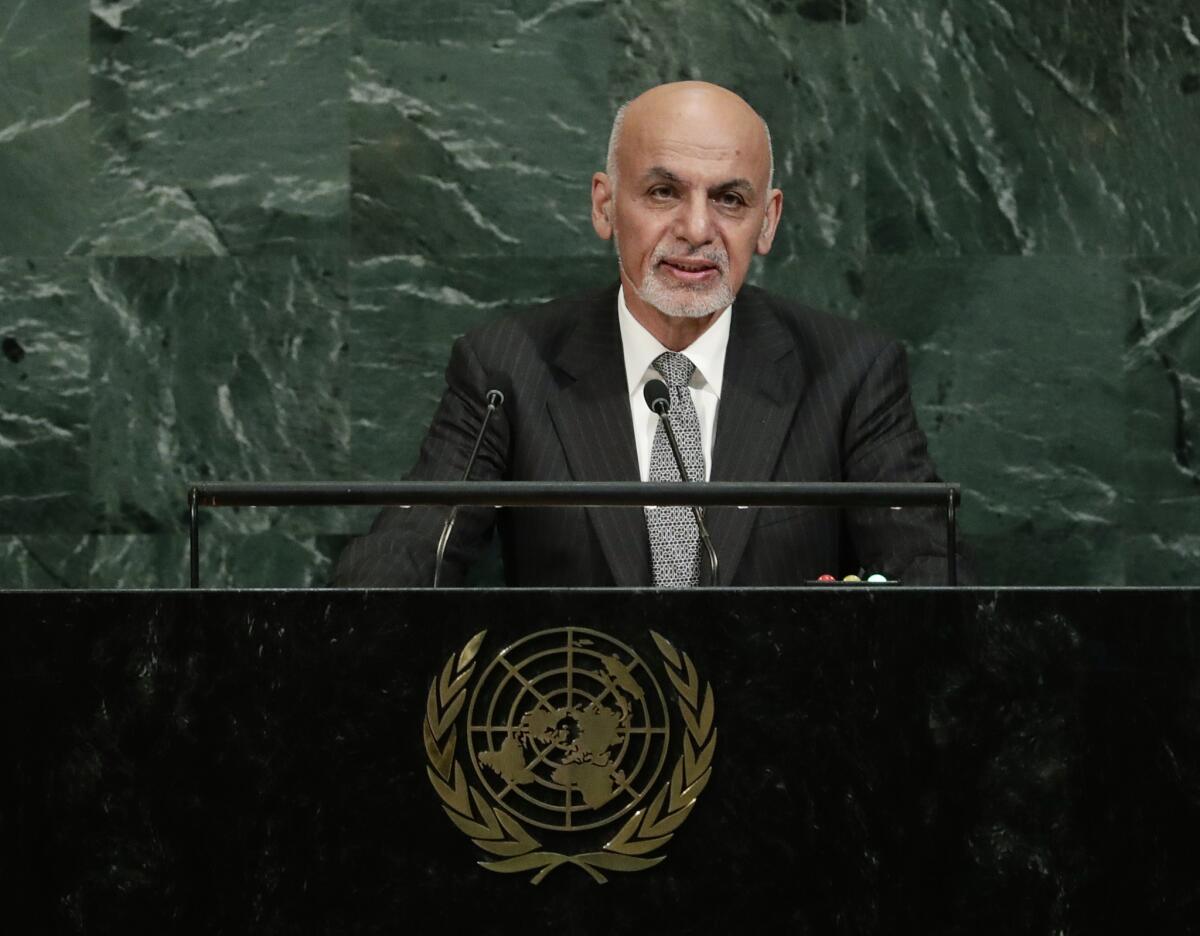
Afghanistan President Ashraf Ghani addressed the U.N. General Assembly on Tuesday in a speech that praised U.S. plans to send thousands more troops to the country in the long-standing fight against terrorism.
Ghani said that 16 years after the Sept. 11, 2001, attacks, which resulted in a U.S. invasion of Afghanistan, violence by terrorist groups remained a substantial threat in the country.
“Driven by transnational terrorist networks, criminal organizations, cyber crime and state sponsorship of terror,” the violence “promises to be a decade-long threat to national security rather than a passing phenomenon,” he said.
Ghani, who was elected president in 2014, has focused on bringing stability to his country and combating militant groups such as the Taliban.
President Trump last month announced a new strategy that includes sending 4,000 more troops to Afghanistan, in addition to about 8,400 U.S. and 5,000 North Atlantic Treaty Organization troops there advising Afghan security forces.
“With President Trump’s recent announcement of his strategy to counter terrorism and bring stability to South Asia, Afghanistan’s enduring partnership with the U.S. has been renewed and redirected,” Ghani said.
Congress authorized the war in Afghanistan after the 2001 attacks.
Before becoming president, Trump denounced the war, calling it a “terrible mistake” and tweeting in 2013 that “we should leave Afghanistan immediately.”
- Share via
Netanyahu to U.N.: Iran is a menace and nuclear deal a mistake
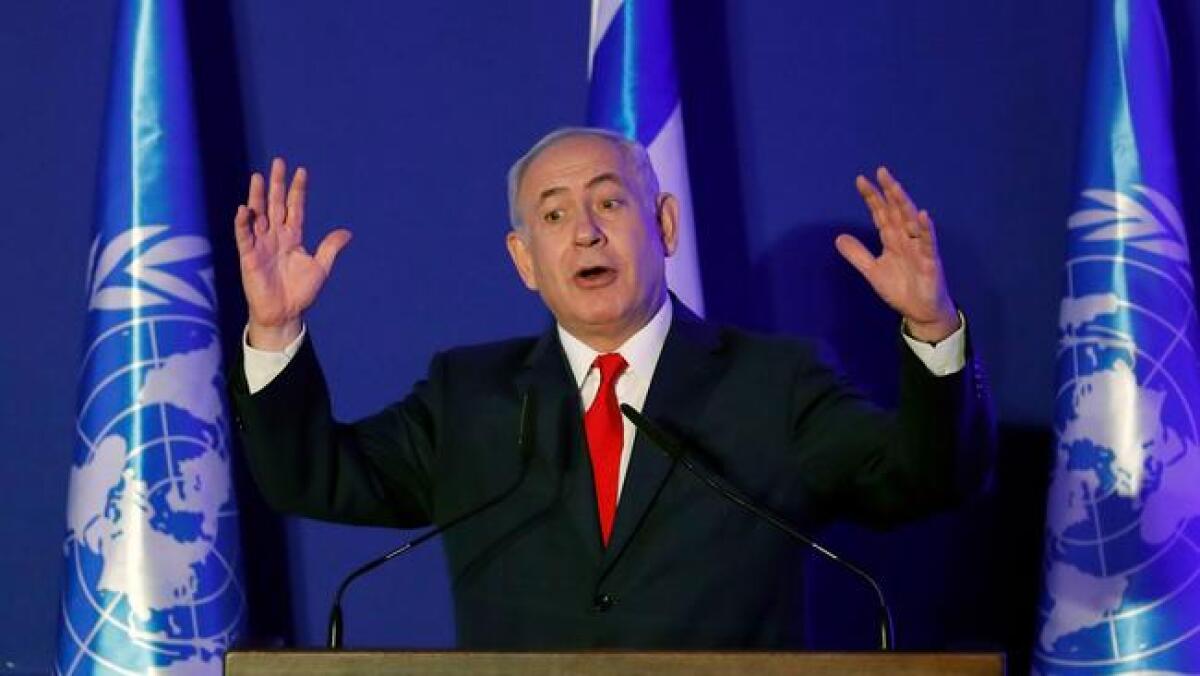
Israeli Prime Minister Benjamin Netanyahu had little to say about prospects for peace with the Palestinians — but plenty to say about the Iran nuclear accord, which he vehemently opposes.
Netanyahu, addressing the General Assembly on its opening day Tuesday, called Iran’s nuclear ambitions a “dark shadow” and said its rulers “vow to destroy my country.” That echoed rhetoric employed a short time earlier by President Trump, who called Iran’s government a “reckless regime” and suggested the landmark 2015 accord would be revisited.
Calling yet again for the scrapping of the pact between Iran and six world powers, Netanyahu said the nuclear deal “doesn’t block Iran’s path to the bomb, but actually paves it.”
“Change it, or cancel it. Fix it, or nix it,” the Israeli leader challenged. “Nixing the deal means restoring massive pressure on Iran, including crippling sanctions, until Iran fully dismantles its nuclear weapons capability.”
After discussing the Iranian nuclear accord at length, Netanyahu did refer briefly to Israel’s hopes for “peace with all our Arab neighbors, including the Palestinians.”
He said he considered Trump an ally in that effort, adding: “Together we can seize the opportunities for peace, and together we can confront the great dangers of Iran.”
Netanyahu has made clear he does not consider the General Assembly a forum friendly to Israel, and he was critical of actions including last December’s Security Council resolution condemning Jewish settlement-building.
Immediately before the Israeli leader spoke, Turkish President Recep Tayyip Erdogan called the Palestinian question the “gaping wound of the world” and called for a halt to settlement activity.
- Share via
France’s Macron defends Iran nuclear deal and says climate pact is not up for renegotiation
In a pointed rejection of President Trump’s “America first” approach to foreign policy, French President Emmanuel Macron on Tuesday urged world leaders to join together to confront global challenges, including war, terrorism, immigration and climate change.
“Today, more than ever, we need multilateralism,” Macron said in his maiden address to the United Nations General Assembly. “Why? Because our challenges are global.”
Macron said he “profoundly respects” Trump’s decision to withdraw from a landmark agreement reached in Paris in 2015 to fight global warming by reducing greenhouse gas emissions. But although he said the deal could be improved, he emphasized, “This accord will not be renegotiated.”
“The future of the world is that of our planet, which is in the process of taking its revenge against the foolishness of men,” he said, referring to recent hurricanes that brought devastation to parts of the Caribbean, Texas and Florida.
Macron’s appeal for collective action and dialogue between nations was in sharp contrast to a speech delivered by Trump, in which he decried a landmark nuclear disarmament deal reached with Iran in 2015 as “an embarrassment to the United States” and threatened North Korea with “total destruction.”
North Korea’s recent nuclear and missile tests present the world with an “existential” threat, Macron said. “Our responsibility, with all our partners, including China, is to bring it back to the negotiating table.”
Macron hailed the agreement reached between Iran and six world powers, including the U.S., as a “solid, robust and verifiable” way to ensure the Islamic Republic does not also arm itself with nuclear weapons.
“To denounce it would be a grave error,” he said. “Because it is a good deal, essential to peace at a time where the risk of an infernal spiral cannot be excluded.”
- Share via
Modern slavery has placed millions of people in bondage in the last five years, report says
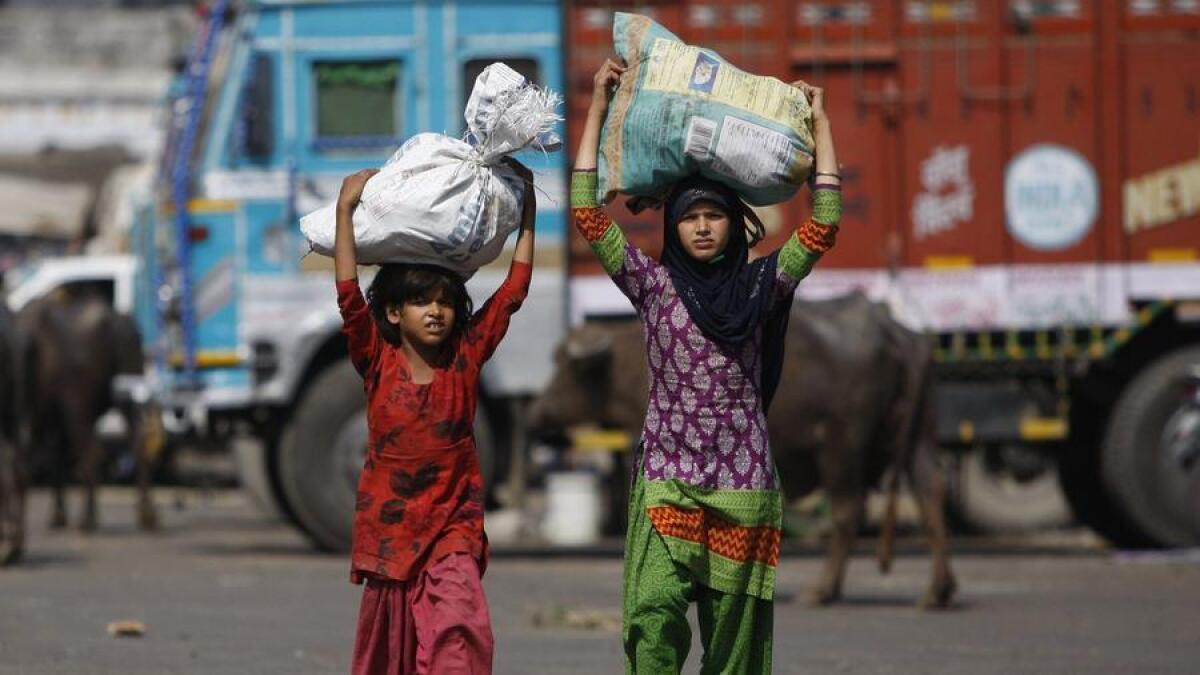
“Global Estimates of Modern Slavery,” a new report by the Walk Free Foundation and the International Labor Organization, says 89 million people experienced some form of slavery in the last five years.
The report, published Tuesday, said an estimated 25.9 million men, women and children were forced to work against their will in 2016.
“Today, women and girls are predominantly being subjected to forced labor in domestic work and the sex industry, whereas men and boys are being subjected to forced labor in construction, in manufacturing and in fishing,” said Fiona David, the Walk Free Foundation’s executive director of global research. The foundation is working to end slavery and human trafficking.
Also, the report said 15.4 million people were confined to a marriage to which they had not consented. Most of the enslaved are women and girls, who make up 71% of the overall total of enslaved people.
The report demonstrates the challenges of achieving the United Nations’ goal of combating forced labor, modern slavery and human trafficking in all its forms by 2025. The report examines different forms of forced labor, which it said occurred in every region of the world in 2016.
The core statistics were based on national surveys involving interviews with more than 71,000 respondents across 48 countries, researchers said. It was supplemented with data from the International Organization for Migration. The report warned the numbers were conservative estimates due to the limitations of the data.
- Share via
Read President Trump’s full remarks at the U.N. General Assembly
The United States has great strength and patience, but if it is forced to defend itself or its allies, we will have no choice but to totally destroy North Korea. Rocket Man is on a suicide mission for himself and for his regime.
— President Trump to General Assembly
- Share via
Will Kim Jong Un be deterred by Trump’s threat?
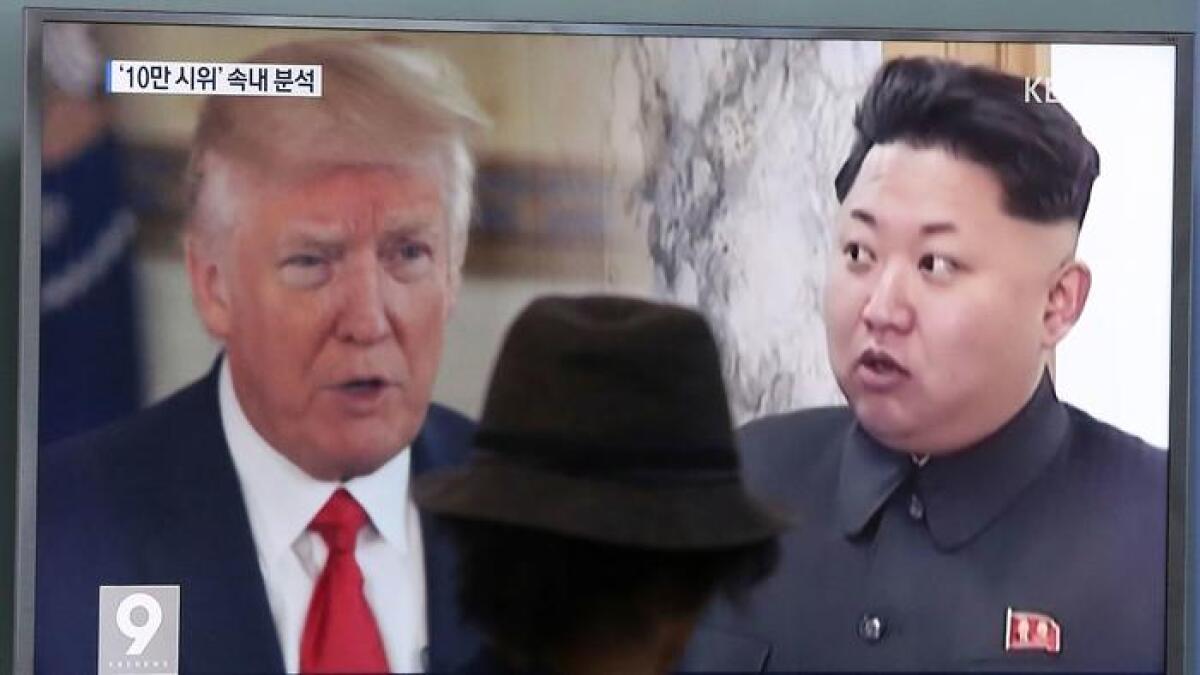
The North Korean ambassador to the United Nations walked out just before President Trump’s speech, so there was no immediate read-out on what he or his ultimate boss, Kim Jong Un, might have thought of the nickname “Rocket man,’’ or the warning that the United States might have to “totally destroy North Korea.’’
But North Korea watchers who have proven adept in the past at channeling the reactions of the Pyongyang regime expect a suitably incendiary response.
“Holy cow,’’ said Sue Mi Terry, a former CIA analyst who has been following the country for two decades. “If I were Kim Jong Un, I’d think, I better accelerate this thing and finish building my nuclear weapon before it’s too late. These threats will only increase the hysteria and paranoia in North Korea.’’
“They will threaten to destroy him [Trump] in language even more colorful than he could muster,’’ predicted Michael J. Green, a former Asia advisor to President George W. Bush. Green said, however, that Trump was right in taking a hard line to warn North Korea that the United States will not tolerate any belligerence towards its allies, South Korea and Japan.
Bruce W. Bennett of the Rand Corporation said Trump’s warning, although blunt, did not differ in substance from what has been the U.S. policy for decades. “The U.S. has always said that if it needs to defend itself or its allies against North Korean aggression, the regime will be destroyed,’’ said Bennett. “I think Trump needed to be very explicit with them.”
Repeated telephone calls to the North Korean mission to the U.N. went unanswered Tuesday morning. Ambassador Ja Song Nam was seen leaving the room before Trump arrived to speak, leaving only a junior diplomat as a representative. NBC news reporters said they were told he left in order to “boycott” the speech.
- Share via
Dianne Feinstein says Trump used U.N. ‘as a stage to threaten war’
- Share via
Human Rights Watch calls for U. N. General Assembly to condemn Myanmar’s military in Rohingya crisis
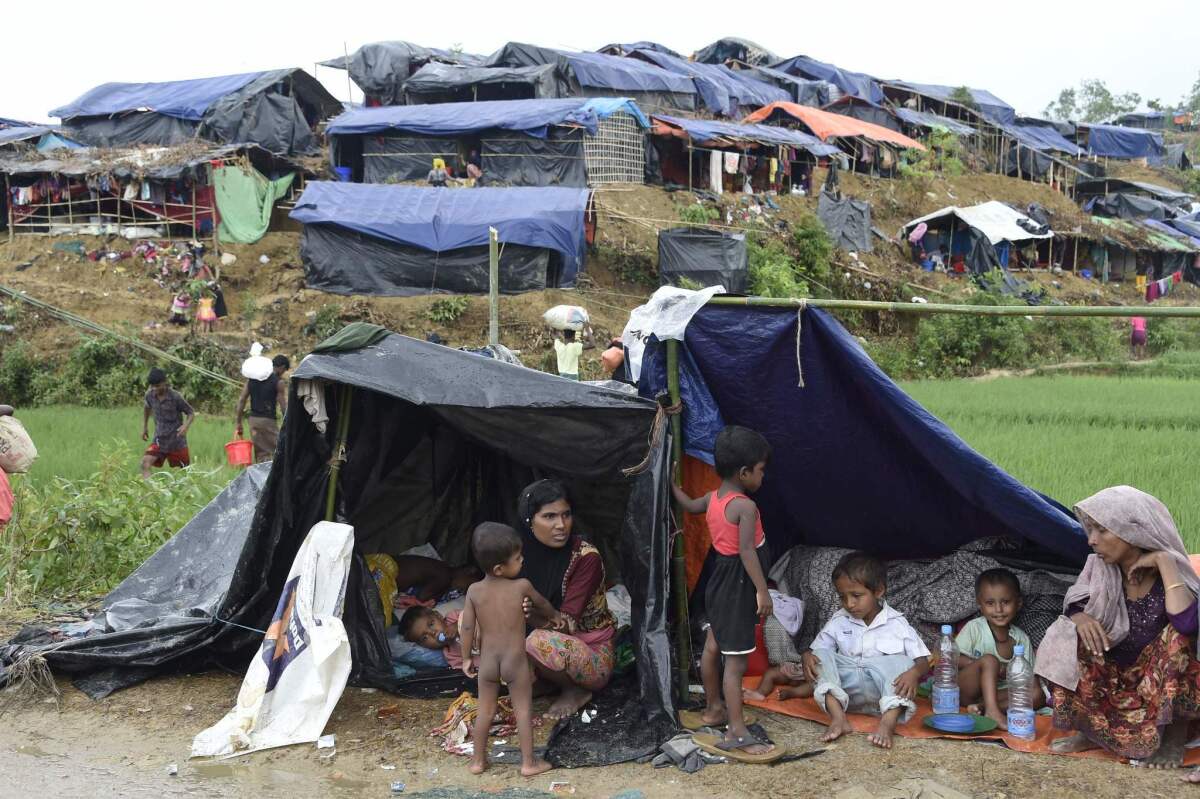
Human Rights Watch on Tuesday called for the U.N. General Assembly to condemn the Myanmar military campaign against the country’s Rohingya Muslim population and urged the U.N. Security Council to impose sanctions and an arms embargo against the army.
More than 400,000 Rohingya have escaped Myanmar, also known as Burma, into Bangladesh since the military responded to an Aug. 25 insurgent attack by carrying out deadly operations in the western state of Rakhine, human rights groups said. The military has shot civilians as they fled and burned Rohingya villages to the ground.
The situation in Myanmar, a mostly Buddhist country, has generated criticism of the governing party’s leader, Aung San Suu Kyi, who addressed the crisis publicly for the first time Tuesday in a nationally televised speech from the capital, Naypyitaw. She said the government wanted to find out why the exodus was happening.
Suu Kyi, a Nobel Peace Prize recipient who led the opposition to the nation’s former military leaders, also defended the military and accused the international community of overlooking other challenges facing the country.
The government views members of the ethnic and religious minority as illegal immigrants from Bangladesh and not among the dozens of national ethnicities officially recognized by Myanmar. Rohingya activists say many families have lived in Myanmar for years.
The U.N. General Assembly is meeting in New York this week.
- Share via
One word to rule them all: ‘Sovereign’
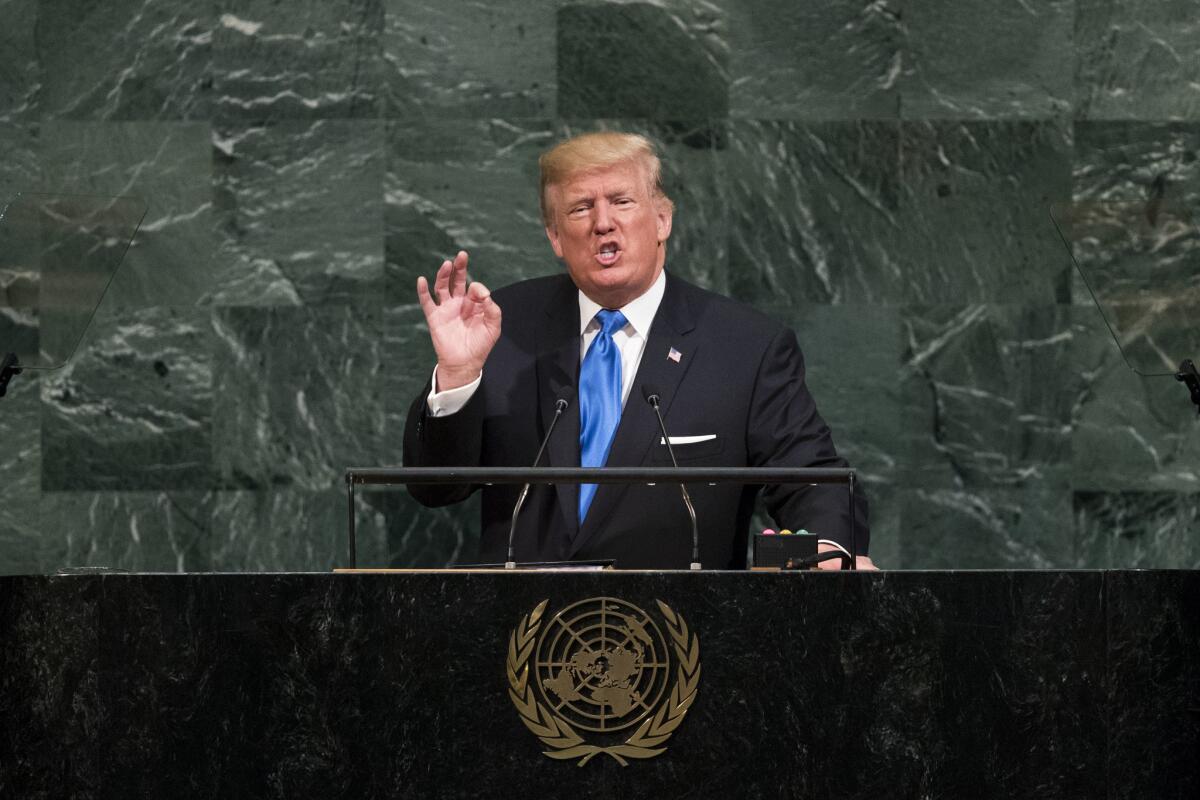
The governing theme of President Trump’s speech to the United Nations General Assembly could be summed up in one word: sovereignty.
In a 42-minute speech, “sovereign” and its variations appeared 21 times, most frequently in the opening and closing parts of the address.
Trump clearly rejected the emphasis that his predecessor, Barack Obama, and other Democrats have put on international institutions and multiparty agreements that restrain national sovereignty.
“The nation-state remains the best vehicle for elevating the human condition,” he declared -- a sentiment that many internationalists would dispute.
“Our success depends on a coalition of strong and independent nations that embrace their sovereignty, to promote security, prosperity and peace for themselves and for the world,” he said.
At the same time, as several analysts noted, Trump’s respect for the sovereign decisions of independent nations did not extend to the three countries that he singled out for the most criticism -- Iran, Venezuela and North Korea -- which he threatened to “totally destroy” if they force the U.S. to “defend itself or its allies.”
Those countries, Trump put in a separate category of “rogue regimes that violate every principle on which the United Nations is based.”
“They respect neither their own citizens, nor the sovereign rights of other countries,” Trump said, suggesting that, as a result, they had forfeited their own sovereign rights.
- Share via
Trump, a United Nations foe during his campaign, offers nuanced praise
President Trump, who dismissed the United Nations as feckless and worthless during his campaign, offered measured praise for the institution during his debut speech to the General Assembly on Tuesday, even as he complained that the United States was bearing too much of the cost.
“The United States is one out of 193 countries in the United Nations, and yet we pay 22% of the budget and more,” Trump said. “The United States bears an unfair cost burden.”
Yet he thanked U.N. Secretary General António Guterres “for recognizing that the United Nations must reform,” and singled out for praise efforts led by the U.S. to combat AIDS and malaria and to help empower women around the world.
The dual message suggested that Trump still sees a role for the international body, though a lesser one than either of his predecessors, Presidents George W. Bush and Barack Obama. Trump said that “the nation-state remains the best vehicle for elevating the human condition.”
“This is the beautiful vision of this institution. And this is the foundation for cooperation and success,” he explained. “Strong, sovereign nations let diverse countries with different values, different cultures and different dreams not just coexist, but work side by side on the basis of mutual respect.”
- Share via
Trump: ‘Major portions of the world are in conflict, and some, in fact, are going to hell’
President Trump told the global leaders at the United Nations General Assembly that “major portions of the world are in conflict, and some, in fact, are going to hell.”
It was one of the most dramatic lines in a 40-minute address in which Trump called for a “great reawakening of nations.”
It was also an example of the challenge in the foreign policy approach Trump laid out, at once tolerant of other nations pursuing their own interests without judgments yet sharply critical of Venezuela and other regimes Trump opposes.
“We do not seek to impose our way of life on anyone but rather to let it shine as an example,” Trump said early on, as he emphasized the sovereignty of nations.
He said he did not expect other countries to share in America’s traditions, values or way of life. He said he expected foreign leaders to mirror his “America First” policy of pursuing their own interests ahead of international goals, as long as they peacefully coexisted.
Yet in the second half of his speech, he spoke out sharply against North Korea, Iran, Venezuela and Cuba, in part for how they treat their own citizens and behave in the world.
“America stands for every person living in a brutal regime,” Trump said.
He called for “full restoration of democracy and political freedom in Venezuela.”
- Share via
Trump calls North Korean leader ‘Rocket Man’ in formal speech to U.N., threatens to end Iran deal
President Trump mocked North Korean leader Kim Jong Un as “Rocket Man” and denounced “loser terrorists” in the normally formal occasion of his maiden address to the United Nations General Assembly.
“Rocket Man is on a suicide mission for himself and for his regime,” Trump said in the provocative comments.
“The United States has great strength and patience, but if it is forced to defend itself and its allies, it will have no choice but to destroy North Korea,” Trump added.
It was a forceful speech but highly unusual for the U.N.’s annual gathering of 193 member states.
In addition to using nicknames and other colloquial terms, Trump invoked his campaign rally style by boasting that “The United States has done very well since Election Day.”
He also renewed hints that he would withdraw from the Iran nuclear deal, which was blessed by the U.N. Security Council and is monitored by a U.N. nuclear watchdog agency. Trump has bashed the 2015 accord since his campaign, but has so far resisted leaving.
“We cannot abide by an agreement if it provides cover for the eventual construction of a nuclear program,” Trump said.
He called it “one of the worst and most one-sided transactions the United States has ever entered into” and “an embarrassment to the United States.”
“And I don’t think you’ve heard the last of it,” he added. “Believe me.”
Any president’s initial speech to the global body would merit attention. But Trump’s has garnered even more interest because of his unpredictable nature and because he was highly critical of the U.N. during his campaign, calling it wasteful, useless and ineffective in defending democratic values.
- Share via
Nuclear peril is at highest levels since Cold War, U.N. secretary-general warns
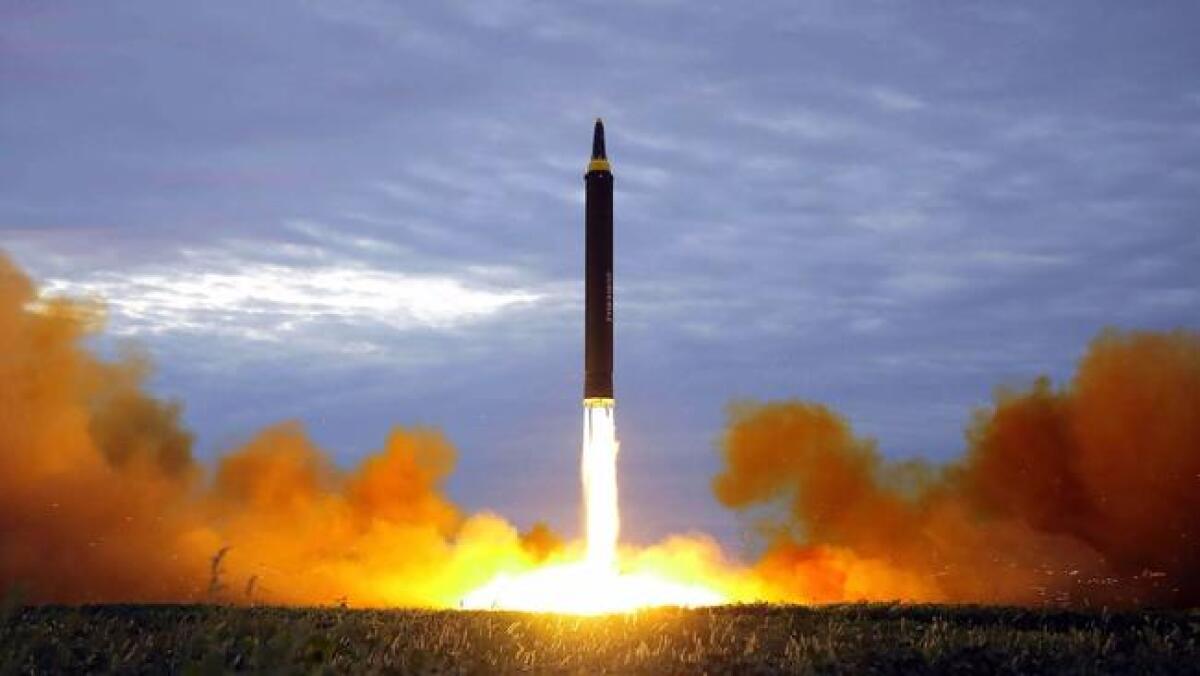
The United Nation’s secretary-general, Antonio Guterres, used a high-profile platform – with President Trump in the audience – to warn that the world is facing its worst nuclear peril since the Cold War, and that “fiery talk can lead to fatal misunderstandings.”
Guterres, delivering his first address as secretary-general to the annual gathering of the world body’s General Assembly, also spoke of the threats posed by climate change and terrorism, and called for common resolve in confronting the refugee crisis.
But some of his strongest admonitions dealt with North Korea and its nuclear program – and how the world responds to it. “We must not sleepwalk our way into war,” Guterres said, calling for statesmanship to rein in North Korea’s mercurial leader, Kim Jong Un.
Kim has repeatedly directed apocalyptic threats toward the United States and American allies such as South Korea and Japan. But Trump has also rattled some world leaders with talk of “fire and fury” that could be directed at the North.
The Portuguese secretary-general, who took the reins at the U.N. earlier this year, called for unity in the face of an array of threats, and spoke out against “those who demonize and divide.”
“Societies are fragmented; political discourse is polarized,” Guterres said. “We are a world in pieces – we need to be a world at peace.”
- Share via
Watch with us: Trump delivers first address to U.N. General Assembly
President Trump will soon deliver his first address to the full United Nations General Assembly, an annual meeting that draws diplomats and leaders from 193 countries.
World leaders who are puzzled by his “America First” doctrine will get one of their most detailed looks at his foreign policy philosophy.
- Share via
Why China’s Xi Jinping is missing from the U.N. General Assembly
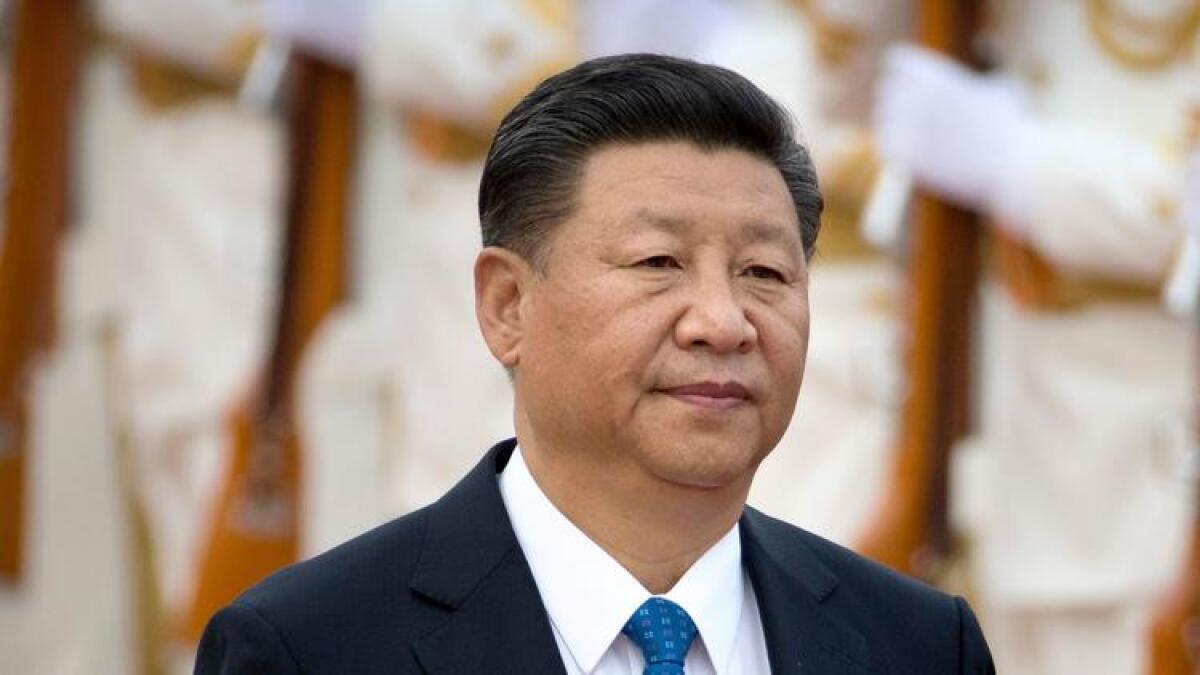
One of the most vocal defenders of globalization and talks with North Korea is sitting out the world’s biggest gathering devoted to them.
Chinese President Xi Jinping is not expected to attend the United Nations General Assembly this week, where heads of state will contemplate issues key to the nation -- including how to respond to the reclusive state and the future of the Paris climate agreement.
The absence is surprising for a leader who has pushed a more assertive, globally engaged China.
Xi arrived at his first U.N. assembly in 2015 with a gift of 8,000 peacekeeping troops and a $1-billion pledge for peace and development. This time, Chinese officials said only that Wang Yi, the foreign minister, is leading a delegation. State media have barely mentioned the event.
Russian President Vladimir Putin also is staying away, although a spokesman made it clear he’s opted to attend joint military exercises with Belarus.
The answer to Xi’s nonappearance may lie with the country’s complex internal politics. The U.N. session comes a month before China’s twice-a-decade party congress. This year is especially important because it is expected to replace about half of the country’s top leadership and reveal the full extent of Xi’s influence. The Congress marks the halfway point of his term, and some analysts expect he will try to stay in power.
There are indications that major party leadership spots “are still up for grabs,” said Willy Lam, a leading China expert at the Chinese University of Hong Kong. “So it’s imperative Xi Jinping stay in Beijing and not allow his enemies to pick up momentum when he’s away.”
Officials have worked to ward off drama ahead of the meetings, from clamping down on investment abroad to banning television shows during prime time that appear “too entertaining.”
Xi’s presence at the session could toss uncertainty into these final few weeks. That’s heightened by President Trump’s debut speech at the U.N. on Tuesday and tensions surrounding China’s role in stemming the nuclear ambitions of North Korea.
“Beijing doesn’t want to be the target of multiple countries and multiple countries’ media pointing their fingers at China,” Lam said.
Xi, in some regards, already had his moment. He addressed the U.N. European headquarters in Geneva in January and portrayed China as a global leader committed to climate change. On that same visit, he gave a robust defense of free trade at the World Economic Forum in Davos.
And even if Xi is not physically present, his phone conversation on Monday with Trump signaled continued engagement.
Foreign Minister Yi “will give a full account of China’s stances and propositions on the international landscape,” ministry spokesman Geng Shuang said last week.
He intends to work with other U.N. members, he added, to “uphold world peace and stability.”
- Share via
What world leaders will be talking about at the U.N. General Assembly
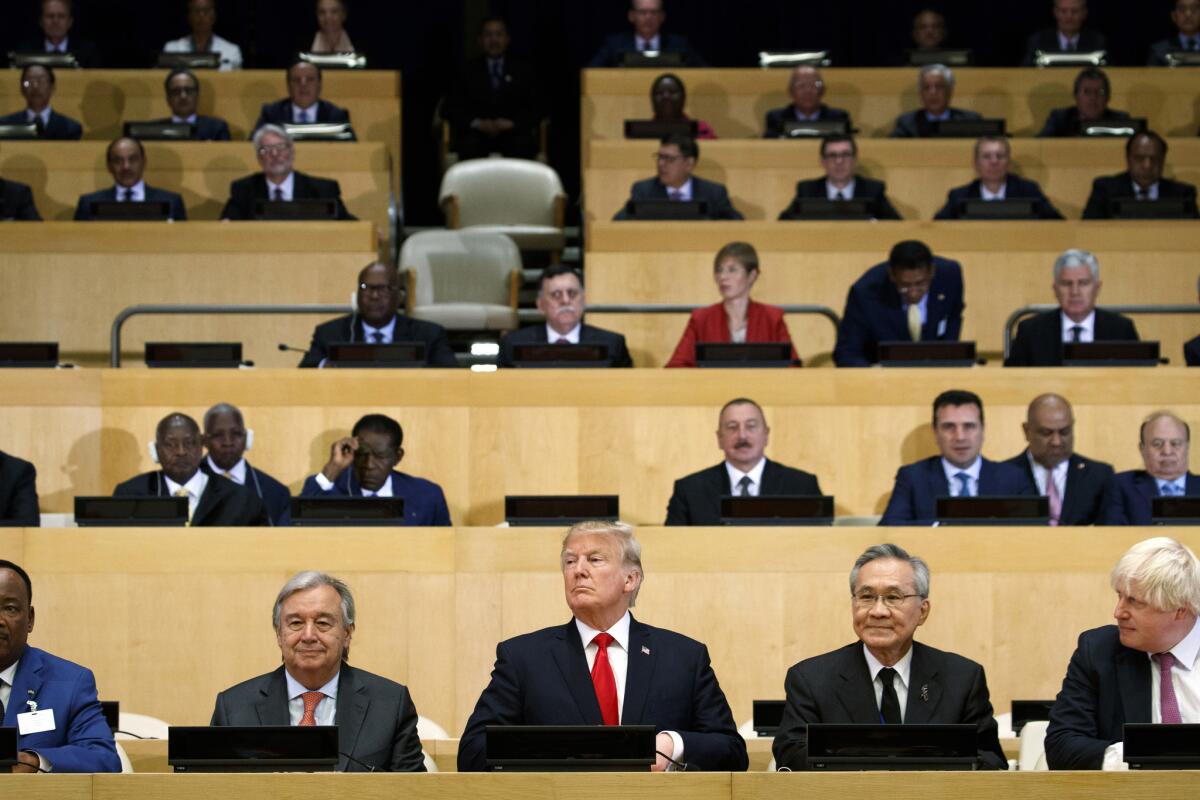
The nuclear threat from North Korea and the plight of Myanmar’s minority Muslims are among the many intractable challenges confronting world leaders as they begin high-level talks at the United Nations General Assembly on Tuesday.
President Trump, who makes his debut before the world body at 10:30 a.m., is attracting much of the attention from diplomats anxious to know what his “America first” approach will mean for international institutions and alliances that have been a bedrock of U.S. foreign policy for decades.
Trump has made his disdain known for what he regards as a bloated U.N. bureaucracy that relies too heavily on the generosity of the U.S. And his administration has staked out positions that are at odds with the U.N. on key issues such as climate change and the deal to curb Iran’s nuclear program.
But he is one of more than 100 heads of state and government expected to deliver speeches and take part in the meetings this week at U.N. headquarters in New York. Here are some of the issues that are expected to take up a majority of their attention:
- Share via
British foreign secretary calls violence against Rohingya Muslims a ‘stain’ on Myanmar’s reputation
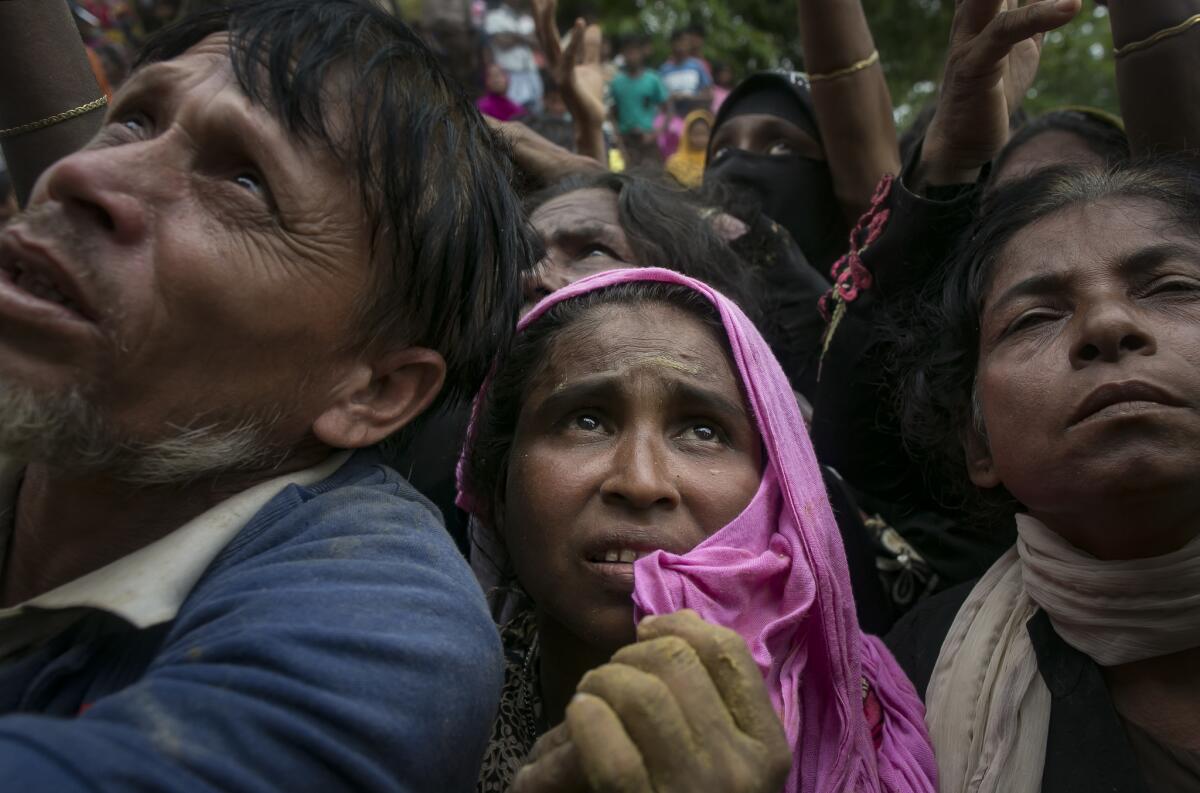
The plight of Myanmar’s Rohingya Muslims, which U.N. officials have described as ethnic cleansing, is getting early attention at the annual gathering of government leaders at the world body.
Britain on Monday presided over a meeting of several Western and Muslim-majority governments that are urging senior Myanmar officials to end the violence and allow humanitarian access.
More than 400,000 Rohingya have fled from Myanmar to Bangladesh in the past month amid a military crackdown triggered by insurgent attacks on security posts in late August.
British Foreign Secretary Boris Johnson said the violence is a “stain” on Myanmar’s reputation, and it’s vital that Aung San Suu Kyi and her civilian government make clear the abuses “must stop.”
The closed meeting was also attended by representatives of Bangladesh, Indonesia, Turkey, Australia, Canada, Sweden, Denmark and the United States.
- Share via
More than 70 top European officials urge the U.S. to re-certify Iran’s compliance with the nuclear deal
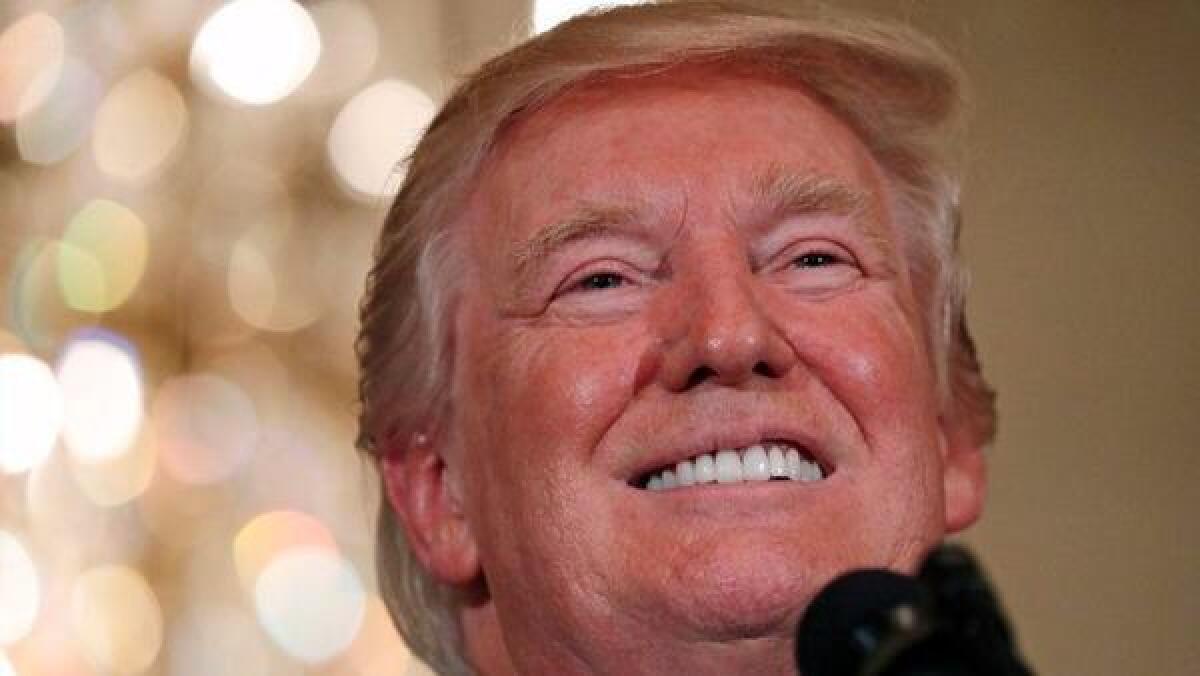
Ahead of President Trump’s speech to the U.N. General Assembly this week, more than 70 top European officials signed a statement urging the United States to re-certify that Iran is in compliance with the 2015 nuclear deal.
The agreement, reached between Iran and six world powers, allows Iran to enrich uranium for use in energy production, but seeks to limit its ability to develop nuclear weapons. In exchange for allowing international inspections, Iran saw some sanctions lifted.
The International Atomic Energy Agency, which monitors the deal, said last month that Iran was continuing to satisfy its obligations.
But the Trump administration, which has twice re-certified the deal, has suggested that it may not do so again next month. In July, the United States imposed some new sanctions on Iran for launching a missile into space, a move that Trump said violated the “spirit” of the agreement.
The European statement said that while it wants to address U.S. concerns over Iran’s nuclear ambitions, it would be “unwarranted” for it not to certify that Iran is in accordance with the terms of the agreement.
The statement urged Trump and the U.S. Congress to “accept that the fastest path to an Iranian nuclear weapon would be to undermine this agreement.” It said that not re-certifying Iran would damage the United States’ credibility with Europe.
“Unilateral U.S. action that jeopardized the [nuclear agreement] would be a grave mistake,” the statement said. “It would make it harder to keep Iran and its region non-nuclear and more difficult for the United States and her allies to tackle unacceptable Iranian behavior.”
The signatories — who included former British Defense Secretary George Robertson, former NATO Secretary-General Wolfgang Ischinger and a wide range of other political, diplomatic and military figures — warned that not re-certifying Iran would give hard-liners more ammunition for their campaign to reduce engagement with the West.
The statement also urged the other parties to the agreement — Britain, China, Russia, France and Germany — to protect the deal in the event the United States backs out and to make clear in public and private that the United States would hurt its international standing if it were to reimpose nuclear-related sanctions on Iran.
During a public briefing with Israeli Prime Minister Benjamin Netanyahu in New York on Monday afternoon, Trump was asked if he planned to keep the United States in the nuclear deal.
“You’ll see very soon,” he said. “You’ll be seeing very soon.”
- Share via
Protest fatigue keeps anti-Trump protests subdued
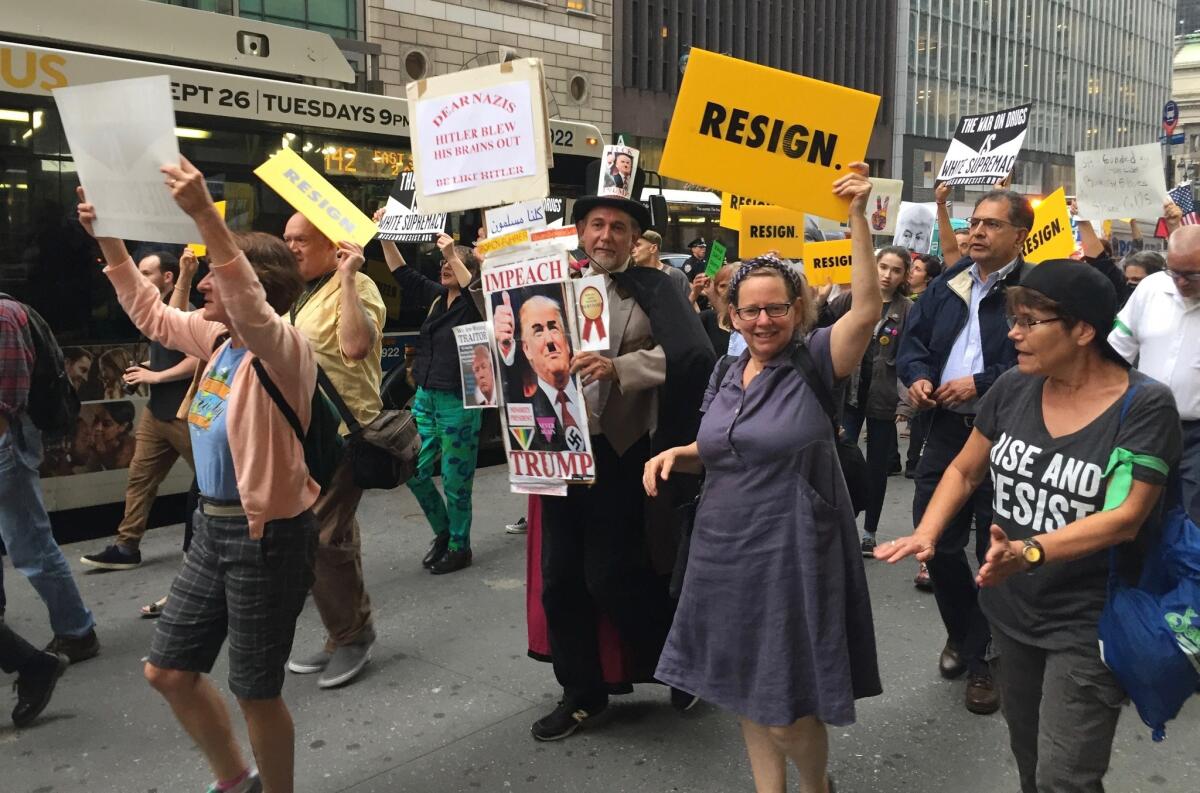
Rise. Resist. Protest and persist.
That’s at least what the signs implored at a rush-hour demonstration Monday evening at New York’s Grand Central Terminal. But fewer New Yorkers are heeding the call to action. At what was supposed to be the first big protest against Donald Trump’s appearance in the city, fewer than 1,000 protesters attended.
“It’s kind of like battle fatigue. People are worn out,’’ said Judy Cuttler, an Iowa-born artist who said she first came to New York in 1969 to protest the Vietnam War. With Trump back in New York for the U.N. General Assembly, she had been expecting big protests against his presence. “I couldn’t find any so I came here,’’ said Cuttler, who had joined the modest crowd in a march against white supremacy.
Demonstration organizers said, however, they expect crowds to pick up later in the week with events planned almost every day of the U.N. gathering. Richard Rice Alan, a professional entertainer who was marching in a top hat and suit plastered with slogans comparing Trump to Hitler, said people were not so much worn out as regrouping.
“I myself had to pull back for a while. I had to get my rage under control,’’ he said.
Even a pro-Trump demonstrator, who tried to heckle the protesters, seemed disappointed by the lackluster showing. He darted between the demonstrators, planting himself directly in their path — waving his Trump 2020 flag so close in people’s faces that he almost hit a few.
Nobody bothered to pick a fight.
- Share via
White House says Trump and Netanyahu agree on need to counter Iran’s ‘malign influence’
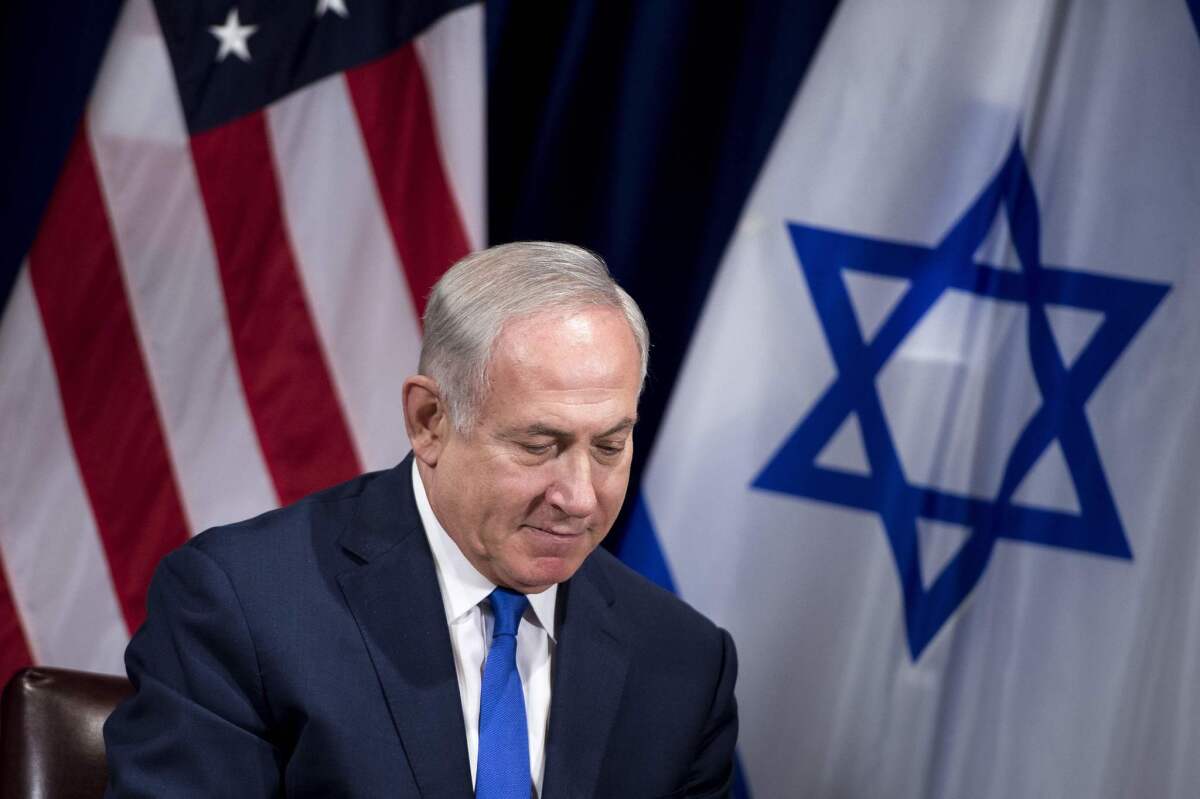
Israeli Prime Minister Benjamin Netanyahu and President Trump, meeting in New York on Monday, discussed the two leaders’ shared aim of “countering Iran’s malign influence in the region,” the White House said.
Trump and Netanyahu have previously bonded over mistrust toward Iran. During the 2016 presidential campaign, Trump denounced the landmark 2015 nuclear pact between Iran and six world powers as a terrible deal. Netanyahu had lobbied vehemently against the agreement, irritating the then-Obama administration by using a speech to both houses of Congress to make his case.
But Trump has softened his stance somewhat since taking office. Over the summer, his administration grudgingly declared that Tehran was in technical compliance with the accord, but that determination must be made every three months and is next due in mid-October.
Netanyahu took an upbeat tone in a post-meeting tweet. “Was great meeting with you today,” he told Trump on Twitter. “Together we are bringing the US-Israel alliance to even greater heights.”
The White House said the two sides “discussed their continued cooperation across a range of issues and stressed their goals of countering Iran’s malign influence in the region and resolving the Syria crisis in a manner consistent with American and Israeli security interests.”
Without giving details, the statement said the two “also discussed their continuing efforts to achieve an enduring Israeli-Palestinian peace agreement, the optimism in the region about peace, and expanding economic opportunities to improve conditions for peace.”
Those hopes for a regional buy-in for the peace process are in line with the U.S. position when Trump traveled to Israel in May and met with Netanyahu, but Israel’s Arab neighbors are very unlikely to sign on to a renewed peace effort that does not include concrete steps such as a halt to Jewish settlement-building.
Little pressure toward that end appears forthcoming from Washington. The White House statement said the president had promised Netanyahu to shield Israel against “unfair treatment” at the United Nations, which has repeatedly denounced settlement expansion.
As president-elect, Trump had expressed outrage in December when the outgoing Obama administration declined to exercise its veto power to block a U.N. Security Council resolution calling for a halt to Israel’s settlement activity on Palestinian lands.
Later in the week, Trump is to meet with Palestinian Authority President Mahmoud Abbas. The two had a less-than-cordial encounter during Trump’s visit to the region in May.
- Share via
Netanyahu would like to pull back the Iran nuclear agreement. But will he get what he wants?
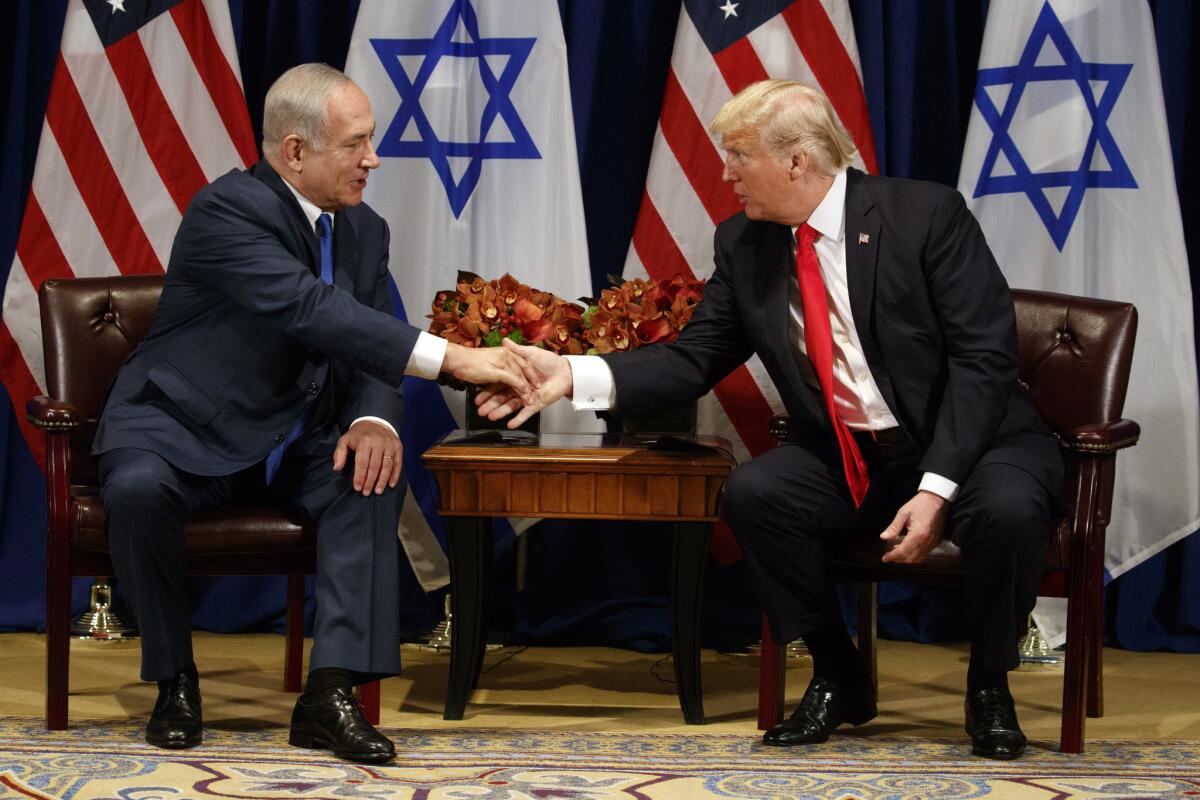
With his eye on domestic politics, Israeli Prime Minister Benjamin Netanyahu traveled to New York this week hoping to return home with a promise that the U.S. president will attempt to “modify” the 2015 deal with Iran to limit its nuclear program, Israeli sources said.
Netanyahu was also hoping to avoid the subject of peace talks with the Palestinians.
But the Israeli and American leaders seemed to come to their meeting Monday in New York, their third encounter this year, with different agendas.
Trump has until Oct. 15 to notify Congress whether Iran is living up to its commitments under the deal, which was spearheaded by President Obama in an attempt to curb Iranian nuclear ambitions. Netanyahu is an implacable opponent of the agreement, and Trump is certainly no proponent — as a presidential candidate, he termed it “a terrible deal.”
But even if the United States were to pull out of the pact, any modification would require an agreement from the other five signatories, which include China, Russia, Germany, France and the United Kingdom.
Trump on Monday seemed eager to change the subject.
“We are going to discuss peace between Israel and the Palestinians; it will be a fantastic achievement,” Trump said during a brief media event before meeting privately with Netanyahu for an hour.
“We are giving it [an] absolute go — there is a good chance it could happen. Most people would say there is no chance whatsoever, but I think that with the ability of Bibi and the other side — I really think we have a chance,” Trump said, using Netanyahu’s nickname.
In a manner of a response to the president, the prime minister said, “Peace between Israel and the Palestinians, and peace between Israel and the Arab world, go together.”
It is a formulation Netanyahu uses often, implying there can be no peace negotiations with the Palestinians until Israel is recognized by the Arab world as a whole.
Despite this position, Netanyahu has by and large ignored the Arab Peace Initiative proposed by Saudi Arabia that would normalize ties between Arab states and Israel in exchange for a total Israeli withdrawal from the West Bank, which Israel has ruled since 1967.
Haaretz reported from New York that “Netanyahu and his staff have insisted in recent days that his meeting with Trump would focus on Iran, and he seemed a bit surprised by the president’s remarks.”
Israeli political analyst Ron Ben-Yishai suggested that Netanyahu’s demand was no more than “Israeli spin.”
“In the current state of affairs, there’s absolutely no chance the nuclear agreement with Iran would be cancelled, and there’s no chance the United States would walk away from the agreement,” he wrote on the Ynet website. “There’s a simple reason for that: None of the countries and international organizations that signed the agreement have an interest in violating it.”
Trump said he expected to have a response regarding Iran “very soon.”
- Share via
United Nations says detained Americans in Iran are being held illegally, demands their immediate release
The day after Iran’s President Hassan Rouhani arrived in New York to join world leaders at the United Nations General Assembly, the U.N. demanded the release of an Iranian American businessman and his father, who are being detained in Iran.
The United Nations Working Group on Arbitrary Detention--an independent body of five members appointed by the U.N. Human Rights Council-- found Monday that 45-year-old Siamak Namazi and his 81-year-old father, Baquer Namazi, are being held illegally in Iran and urged the government to immediately release them.
“The deprivation of liberty of Mr. Siamak Namazi and Mr. Mohammed Baquer Namazi... is arbitrary,” the Working Group concluded in its report. “The appropriate remedy would be to release [them] immediately and accord them an enforceable right to compensation and other reparations...”
The Namazis, who hold both U.S. and Iranian citizenship, have been imprisoned in Iran for nearly two years. They were convicted of espionage in a secret trial in 2016 and were each sentenced to 10 years in Tehran’s Evin Prison.
The U.N. group described the practice of Iran arresting dual Iranian American citizens as an “emerging pattern.”
Babak Namazi, the brother of Siamak and son of Baquer, has been working for their release. He said Monday’s decision was an important step forward.
“I am incredibly gratified that the United Nations has found the detention of my father and brother illegal,” Babak Namazi said in a statement.
“This shows unequivocally what we have known all along: that they have done nothing wrong. I urge the government of Iran to release them immediately on humanitarian grounds.”
- Share via
What is Iran looking for at this week’s U.N. General Assembly meeting?
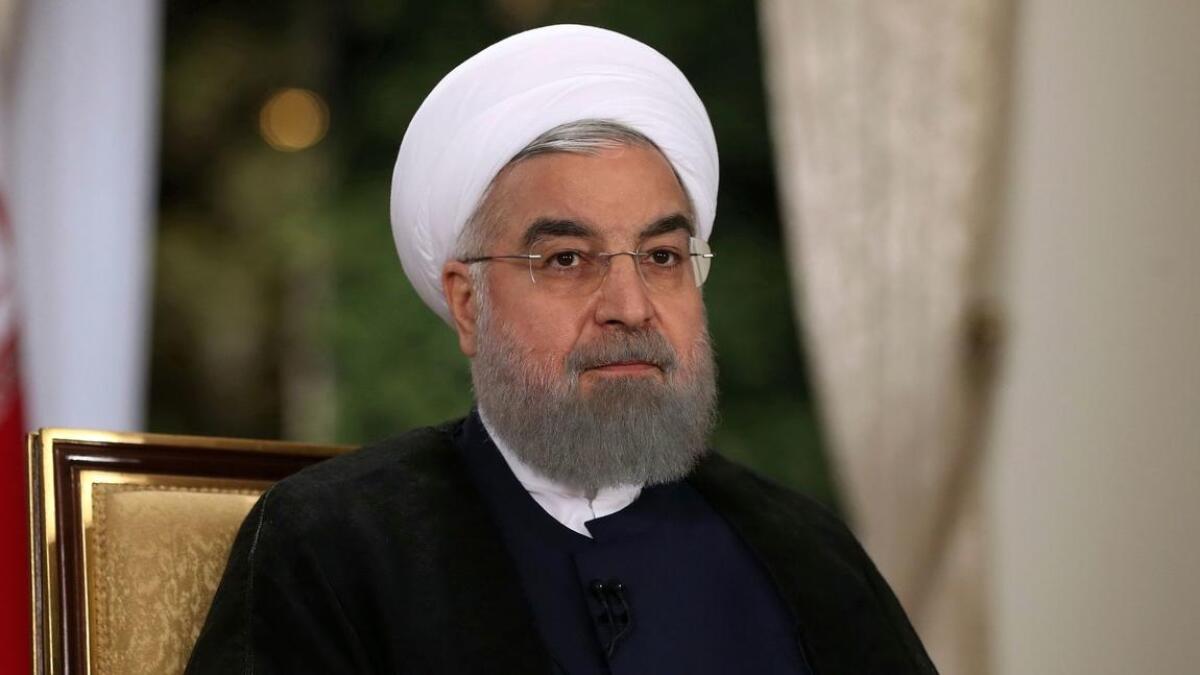
With President Trump’s disdain for the 2015 agreement on limiting Iran’s nuclear program threatening the pact’s survival, Iranian President Hassan Rouhani is likely to focus much of his time at the U.N. General Assembly this week with one main goal in mind: defending the controversial agreement.
During his highly anticipated speech to the General Assembly on Wednesday--along with several other planned meetings--Rouhani will likely argue that Iran has complied with the terms of the deal.
Rouhani, who began his second term as president in May, was largely responsible for spearheading negotiations in 2015 with the United States and other world powers that led Iran to curb its nuclear activities in exchange for relief from international sanctions.
Trump has frequently called the 2015 nuclear deal “the worst deal ever,” and has threatened to rip it up.
Although Trump’s administration has certified twice that Iran is complying with the terms of the agreement, his administration has sent strong signals in recent weeks that it does not plan on certifying Iran’s compliance with the nuclear deal in October.
With tensions between the United States and Iran increasing over this, Rouhani is likely to spend much of his time defending the deal to other world leaders and attempting to show that Iran is abiding by it.
Already Rouhani has set off on this course. In an interview with CNN on Monday, Rouhani warned that “exiting such an agreement would carry a high cost for the United States of America.” He also said he does not believe that “Americans would be willing to pay such a high cost for something that will be useless for them.”
Rouhani told reporters Sunday as he arrived in New York that “the goal of this visit is to...deliver Iran’s voice to the world,” adding later that his strategy is “to have inclusive interaction with the world...”
This is Rouhani’s fifth U.N. General Assembly meeting.
- Share via
California governor says his state has seen a ‘crack in the armor’ of GOP ‘climate denial’
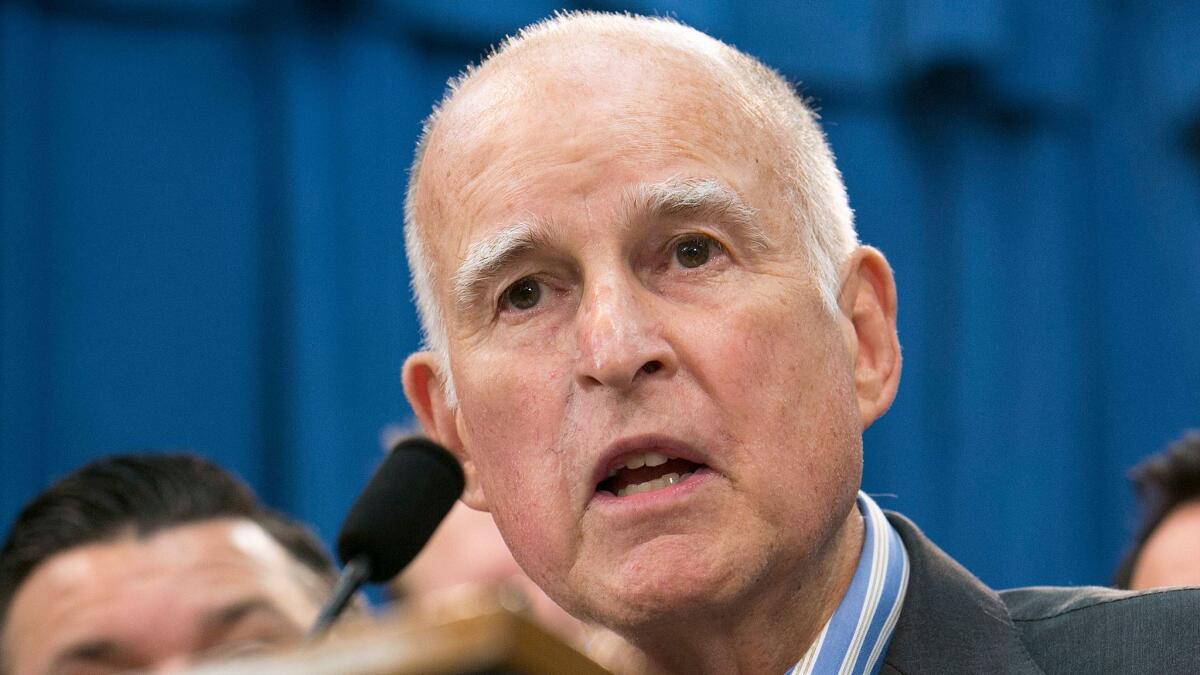
California Gov. Jerry Brown on Monday touted steps the state has taken toward a healthier climate, but warned that powerful forces he called “climate deniers” are resisting technologies and policies designed to improve conditions.
“I like all the optimism around here, but I don’t want to minimize the steep hill that we have to climb,” Brown said at the start of a gathering of international leaders called Climate Week NYC. “Decarbonizing the economy when the economy depends so totally on carbon is not child’s play. It’s quite daunting.”
Hosted by the Climate Group, an international nonprofit organization that works with business and government to promote clean technologies and policies, the event was scheduled to bring together high-profile governors, Fortune 500 companies and multinational businesses for a week to share their strategies and leadership in tackling climate change.
- Share via
Trump’s first speech at the U.N. will focus on sovereignty and reform
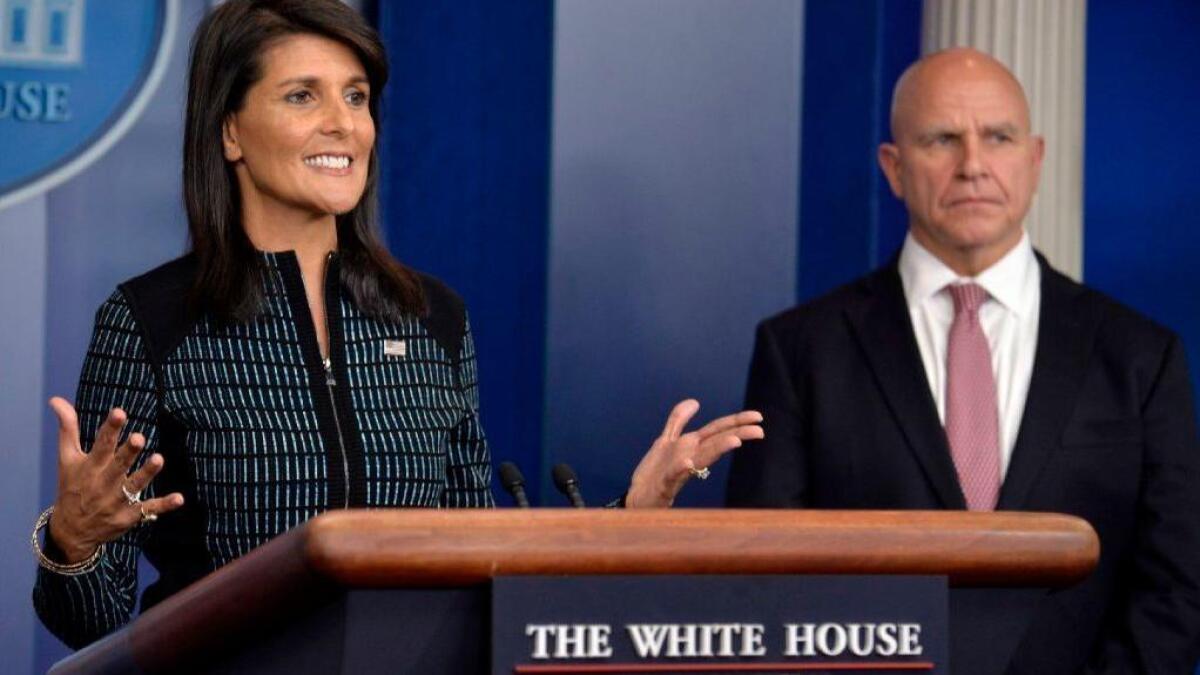
President Trump takes to the world’s largest stage this week. And many onstage are worried.
Trump will deliver his first address Tuesday to the full United Nations General Assembly, an annual meeting that draws diplomats and leaders from 193 countries.
Neither Russian President Vladimir Putin nor Chinese President Xi Jinping are coming this year. That gives even more running room to a celebrity president who has shaken global institutions with his “America first” policy and whom diplomats politely describe as unpredictable.
“People are on tenterhooks,” said Stewart Patrick, an expert on global institutions and governance at the nonpartisan Council on Foreign Relations. “This is the most nationally minded president we’ve had in a long time … walking into the lion’s den.”
- Share via
The U.N. pledged to improve the lives of the world’s most needy. Enacting that plan is another matter
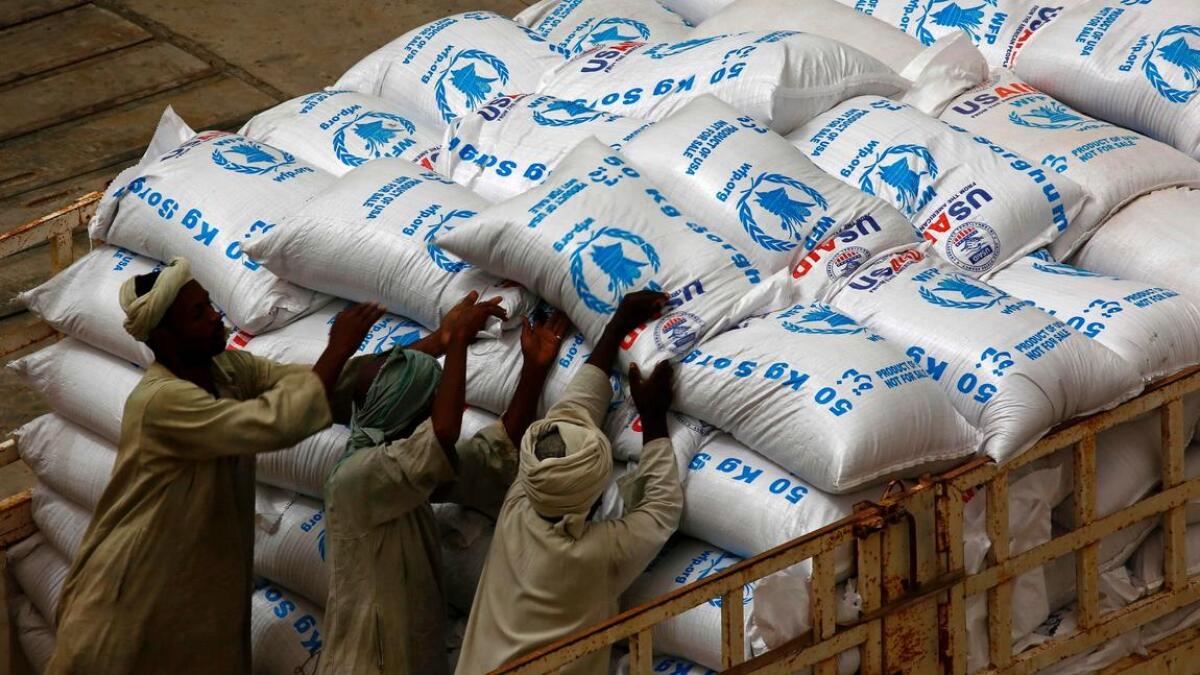
It’s been two years since the United Nations adopted 17 goals aimed at fighting poverty and inequality, protecting the environment and fostering peace.
The target year for achieving those goals is 2030, but that’s little time, given the scope of the agenda, and experts note formidable obstacles stand in the way of achieving these “sustainable development goals,” or SDGs.
“We had the SDG agreements in 2015. Everybody felt very good,” said Homi Kharas, co-director in the global economy and development program at the Brookings Institution.
But while there was progress in 2016 and 2017, there also was some regression, Kharas said. “The pace is not fast enough to achieve the SDGs. I feel that we are coasting somewhat,” he said.
- Share via
Putin to skip this year’s meeting, but Russia’s concerns will top the agenda
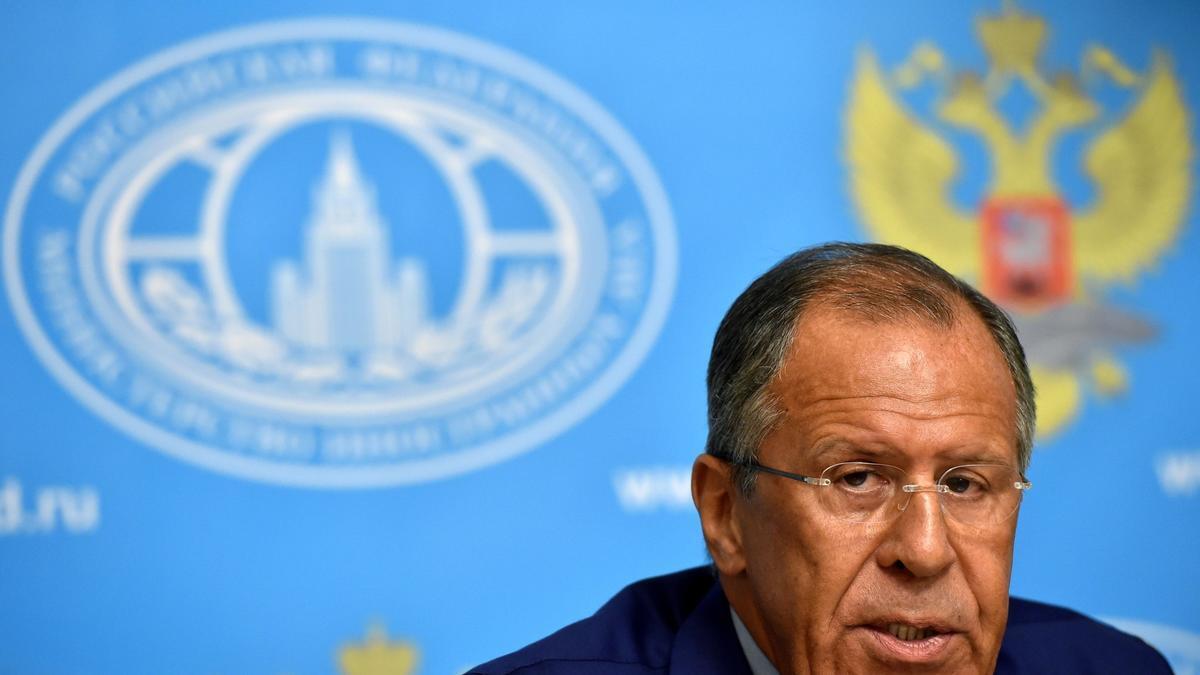
Russian President Vladimir Putin won’t be attending this year’s United Nations General Assembly meeting because of a scheduling conflict. Instead, he’s overseeing a massive joint military exercise with neighboring Belarus that has the West, particularly NATO countries, nervous with speculation about so many Russian soldiers along their borders.
In Putin’s absence, Russian Foreign Minister Sergei Lavrov will speak Thursday. Among the topics Russia will likely want to address are North Korea, Ukraine, Syria and what Moscow sees as a growing sentiment of Russophobia in the West — which the Kremlin see as led by the United States.
Lavrov met this week with U.S. Secretary of State Rex Tillerson in a lead-up to the annual U.N. meeting. They discussed the conflicts in Syria and Ukraine, according to Russian news reports.
Russian Sen. Konstantin Kosachev said Monday that the two diplomats “should coordinate their steps.” Kosachev chairs the International Affairs Committee in Russia’s upper house of parliament.
It will likely prove difficult to coordinate the two countries’ opposing sides on many issues, especially on the question of Ukraine. Russia has proposed the deployment of United Nations peacekeepers in eastern Ukraine, where Kremlin-backed separatist fighters have been engaged in a three-year military conflict with Ukrainian forces.
On Monday, the Russian U.N. ambassador, Vasily Nebenzia, said the U.S. and Ukraine had formally told Russia they are not prepared to work with the Russian proposal as is, according to Russian news agencies. Washington and Kiev support the idea of U.N. peacekeepers in eastern Ukraine, which Putin proposed last week, but want the peacekeeping forces to also patrol the border with Russia, which Kiev lost control of to separatist fighters in 2014.
When it comes to proposals on reforming the U.N., Russian Deputy Foreign Minister Gennady Gatilov said on the sidelines of the meeting that Moscow is looking for a dialogue on how to go about those reforms, according to th the Russian news agency TASS. Earlier, he indicated that Russia would not sign a U.S.-led reform initiative, which has been signed by 128 other countries. The reform proposal calls for deep cuts and staffing of the U.N. and streamlining the organization’s structure.